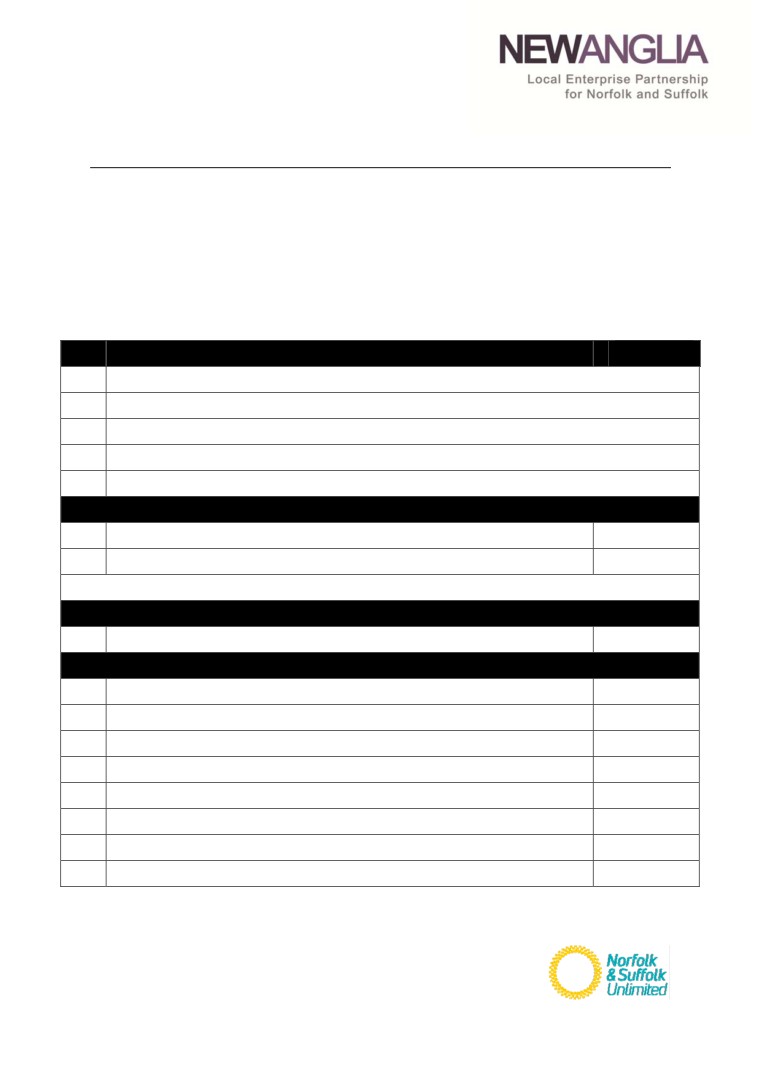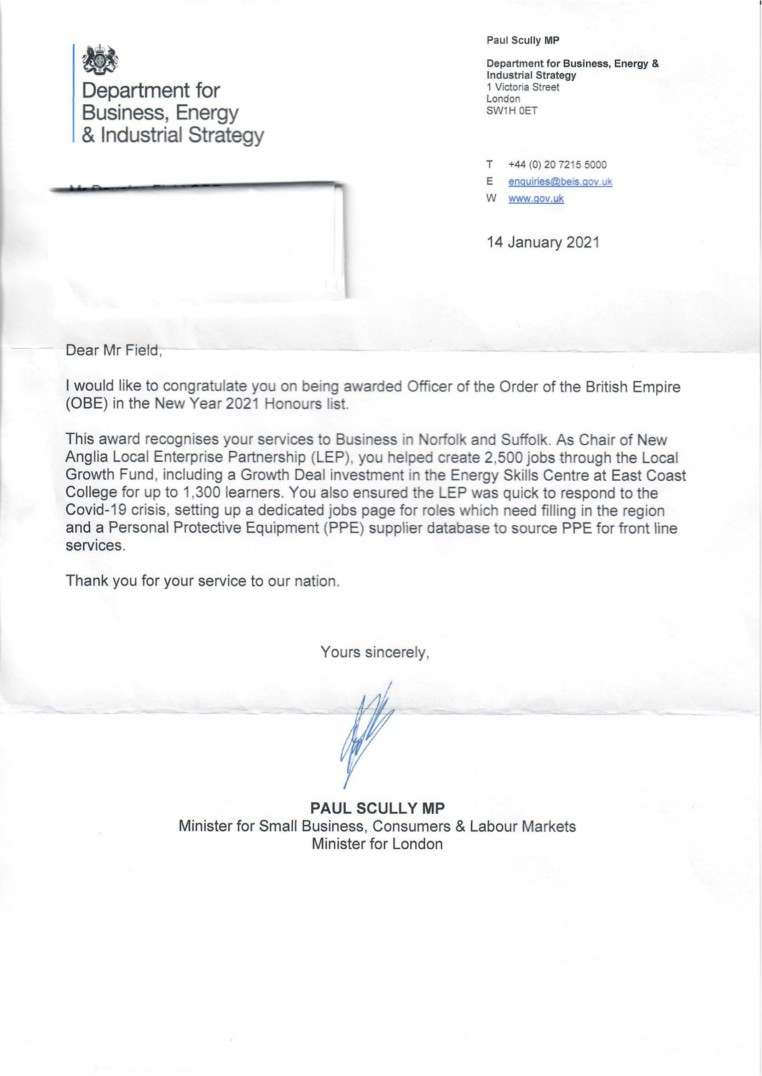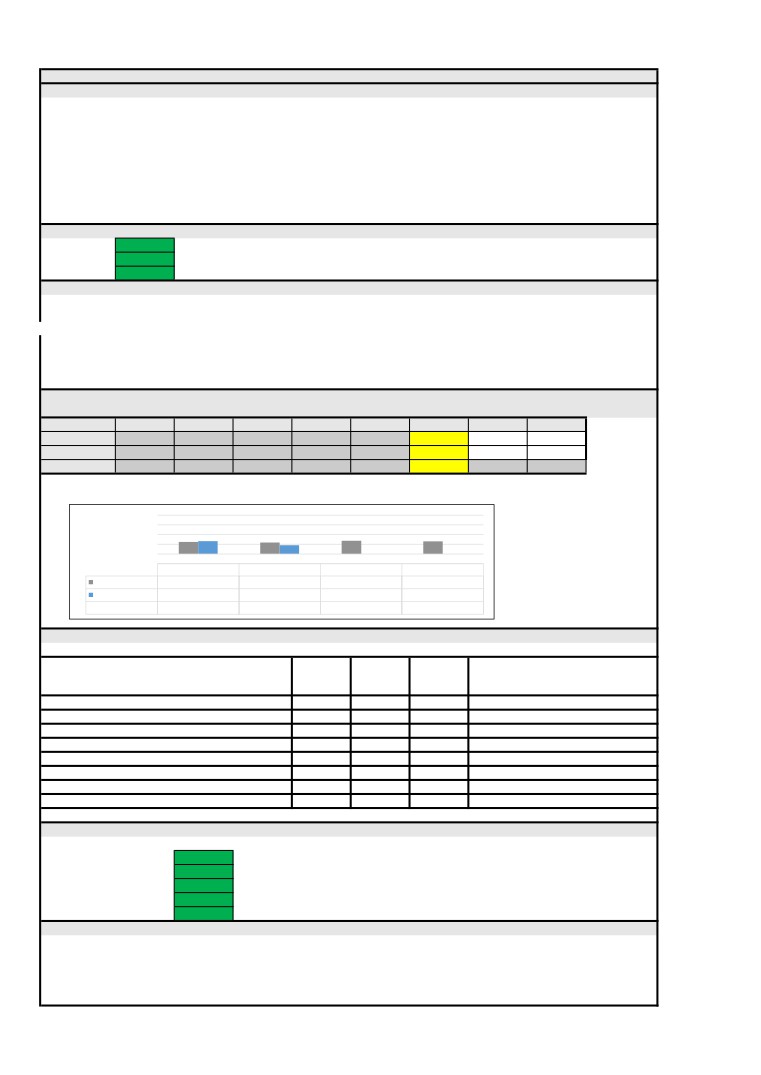New Anglia Local Enterprise Partnership Board Meeting
Wednesday 27th January 2021
10.00 - 12.30pm
Via MS Teams
Agenda
No.
Item
1.
Welcome from the Chair
2.
Presentation from Ian Whitehead, Lane Farm
3.
Apologies
4.
Declarations of Interest
5.
Actions / Minutes from the last meeting
Strategic
6.
2021 LEP Strategic Priorities
For Approval
7.
Trade and Cooperation Agreement Between the EU and the UK
Update
BREAK - 15 Mins
Strategic
8.
Agri-Food Industry Council Report
Update
Operational
9.
Chief Executive’s Report - including confidential items
Update
10.
Connected Innovation
Update
11.
New Anglia Capital Report - Confidential
Update
12.
January Performance Reports - including a confidential report
Update
13.
Quarterly Management Accounts - with confidential appendices
Update
14.
Board Forward Plan
Update
15.
Any Other Business
1
New Anglia Board Meeting Minutes (Unconfirmed)
25th November 2020
Present:
Kathy Atkinson (KA)
Kettle Foods
Sam Chapman-Allen (SC)
Breckland Council
David Ellesmere (DE)
Ipswich Borough Council
C-J Green (CJG)
Brave Goose
John Griffiths (JG)
West Suffolk Council
Matthew Hicks (MH)
Suffolk County Council
Pete Joyner (PJ)
Shorthose Russell
Dominic Keen (DK)
Britbots
Helen Langton (HL)
University of Suffolk
Steve Oliver (SO)
MLM Group
Corrienne Peasgood (CP)
Norwich City College
Andrew Proctor (AP)
Norfolk County Council
Alan Waters (AW)
Norwich City Council
Jeanette Wheeler (JW)
Birketts
Attendees
Dan Greeves (DG)
Pegasus Welfare Solutions - For Item 2
Sian Lloyd (SL)
BEIS
Jai Raithatha (JR)
Suffolk County Council
Vince Muspratt (VM)
Norfolk County Council
Chris Starkie (CS)
New Anglia LEP
Rosanne Wijnberg (RW)
New Anglia LEP
Helen Wilton (HW)
New Anglia LEP
1
3
Actions from the meeting: (25.11.20)
Economic Recovery Restart Plan Progress Report
Sources of visitors to the vacancy page on the New Anglia Web site to be circulated
CS
Insolvency advice to be provided to the Growth Hub
RW
1
Welcome from the Chair
CJ Green (CJG) thanked everyone for joining noting that the second lockdown will have caused
additional pressures on some sectors.
2
Presentation from Dan Greeves, CEO of Pegasus Welfare Solutions
CJG welcomed Dan Greeves (DG), CEO of Pegasus Welfare Solutions which received £25,400 from
the Business Resilience and Recovery Scheme to support the development of sanitary units for
companies working offshore.
DG provided the board on the background to the company highlighting its aims of attracting more
women into the offshore wind industry and increasing productivity.
The board learnt that all units are constructed in Norfolk with extensive use of the local supply chain
and DG thanked the LEP for the financial support it had provided which allowed the company to
develop and launch a new unit. This is a world first and allows self-contained toilets to be fitted into
wind turbines and enquiries have already been received from 5 of the 6 main developers in the UK.
DG confirmed that the LEP support had been game-changing and had given the company the
confidence to relocate to new premises allowing take on 3 more staff and expand the product line.
Benefits had also been received from the media promotion provided by the LEP.
DG advised that the next stage was development of data collection on the units which will reduce the
need for site visits with large cost saving implications. He confirmed that they were also linking up with
other companies on the new site and worked closely with the UEA to reach staff with the required
skills.
CJG thanked DG for his presentation and he left the meeting.
3
Apologies
Apologies were received from Claire Cullens, Johnathan Reynolds and Tim Whitley.
4
Declarations of Interest
None
5
Actions/Minutes from the last Meeting
The minutes were accepted as a true record of the meeting held on 21st October 2020.
6
Inward Investment Delivery Plan
Chris Starkie (CS) presented the paper highlighting the team’s partnership working with
colleagues across Norfolk and Suffolk and recent successes including the purchase of the
Philips Avent site in Sudbury by GCB.
Jeanette Wheeler (JW) noted that following the recent ministerial roundtable proposed linking
with colleagues from the OxCam arc to investigate companies looking to expand outside that
area and that the team could investigate the opportunities his presented.
CS agreed and confirmed that the team work closely with partners from local authorities,
universities and the Department of Trade.
CS reviewed the six workstreams through which the team delivers:
Identification of market need
Identification of market offer
2
4
Communicating/promoting the market offer
Partnership development
Support retention, development, and expansion of existing local businesses
Systems development/management
The meeting discussed the rationale for GCB’s investment and which including offering an
existing building rather than a new build.
CS confirmed that the Norfolk & Suffolk Unlimited (NSU) site included a property index and
agreed that having details of those properties available for repurposing would be beneficial as
this region did not always have the funding available to support new builds as in other areas.
Andrew Proctor (AP) noted the difficulty in setting targets for inward investment and asked if
the offshore wind investment should be highlighted given the importance of the sector for the
region.
CS agreed that it was challenging to set KPIs in the current climate but confirmed that these
would be developed during 2021.
Pete Joyner (PJ) asked whether there was evidence that the NSU brand was helping in
bringing in enquiries. CS advised that it was difficult to ascertain whether this was the sole
factor but agreed that it helped in raising the profile of the region and to position it alongside
the offers from the other regions.
CS noted that the NSU brand had been very well received by the DIT and provided them with
a simple and precise image of the area had supported them around the world.
The Board agreed:
To note the content of the report
To endorse the proposed Inward Investment Delivery Plan
7
Economic Recovery Restart Plan Progress Report
CS presented the progress report which has been designed to sit alongside the original plan
and included updates on the major programmes and successes.
CJG asked if there was any evidence on the sources of visitors to the site. CS confirmed that
work was being done to trace sources and this would be shared to board members.
ACTION: Sources of visitors to the vacancy page on the New Anglia Web site to be circulated
CS
JW proposed providing information to anyone facing redundancy due to insolvency and
suggested compiling a fact sheet to signpost to further support.
CS noted that work was ongoing to scale up local support, support start ups and also support
companies facing insolvency and agreed that Government support has kept insolvency rates
low at the current time but were likely to increase in 2021.
ACTION: Insolvency advice to be provided to the Growth Hub
RW
PJ asked if any sectors were being prioritised for support. CS advised that challenge was to
help those sectors not normally supported such as retail but that the LEP was considering all
areas funding being provided by Government and by all partners and is therefore focussing
on those sectors who have not received any support.
SO asked if other sub-boards were adjusting future plans to account for the plan. CS
confirmed that this was the aim and he was aware that the Innovation Board and Cultural
Board were doing so.
The Board agreed:
To note the content of the report
To note the progress that has been made against the interventions in the Economic
Recovery Restart Plan and approve its publication
3
5
8
EU Exit / End of Transition Period Report - Confidential
The Board agreed:
To note the content of the report
9
Chief Executive’s Report
CS highlighted key items in the Chief Executive’s report including the open letter sent to
Prime Minister in response to the Ten Point Green Recovery plan and the Peer to Peer
Network which is proving successful with over 70 business included so far most of which are
new engagements.
CS presented the video produced by the LEP highlighted 3 of the companies which had
received BR&R grants and the impact that the grant had made.
CS noted that the recent ministerial roundtable had again proved successful and confirmed
that Government are keen to do more.
JW noted that these provided an opportunity to pitch directly to Government and the LEP
should exploit this opportunity at any future ones.
The Board agreed:
To note the content of the report
10
November Performance Reports
Rosanne Wijnberg (RW) presented the reports to the Board and highlighted key items.
Growth Deal - RW noted that the pandemic has caused delays for some projects therefore
delivery and spend are rated amber. Outputs remain green as it is anticipated they will be
met. A rollover of around £18m is predicted.
RW explained the approach for relocating funding if not spent by individual projects.
The meeting reviewed the programme dashboards.
Helen Langton (HL) noted the significant impact of the pandemic on apprenticeships and
noted that these would not be recover until 2022.
The Board agreed:
To note the content of the reports
To approve the Growth Deal dashboard
11
Board Forward Plan
RW presented the board forward plan and asked for any requests to further items to be
submitted to Helen Wilton.
The Board agreed:
To note the content of the plan
4
6
12
Any Other Business
CS advised that he would be receiving a briefing on the Comprehensive Spending Review at
the end of the day and he would be circulate this to board members.
5
7
Actions from New Anglia LEP Board Meetings
Date
Item
Action
Update
Actioned
Target Date
By
25/11/2020
Economic Recovery Restart Plan
Details will be provided at the January Board meeting.
CS
Complete
Sources of visitors to the vacancy page on the New Anglia Web site to be circulated
Progress Report
25/11/2020
Economic Recovery Restart Plan
Insolvency advice to be provided to the Growth Hub
RW has contacted Jeanette Wheeler to discuss further - work in progress
RW
Feb-21
Progress Report
23/09/2020
New Anglia Capital
Board members to consider putting themselves forward to join the NAC board
Kathy Atkinson has offered to join the NAC Board and has been invited to
CS
Mar-21
meet the NAC directors at the NAC Board meeting in March.
23/05/2019
Growth Hub Presentation
Growth Hub Annual review to be circulated to the Board when published
This review will now take place early in 2021
CD
Apr-21
9
New Anglia Local Enterprise Partnership Board
Wednesday 27th January 2021
Agenda Item 7
Trade and Cooperation Agreement Between the EU and the UK
Author: James Allen. Presenter: Chris Starkie.
Summary
This report is an executive summary of the report on the Trade and Cooperation Agreement
struck between the EU and the UK detailing the contents of the deal, potential implications for
sectors, potential economic impact, emerging intelligence and LEP activity.
Please see Appendix A for the full report
Recommendations
The Board is asked to note the contents of the report.
Background
The UK and EU successfully negotiated the Trade and Cooperation Agreement on 24th
December, which was ratified on 30th December ahead of the end of the transition period on
31st December. This agreement is accompanied by a series of political declarations and
agreements over nuclear and security cooperation. There are commitments for further deals
and announcements in the coming months and years - with a focus on services, financial
services equivalence and data adequacy all announced.
Contents of the deal:
The deal secures zero tariffs and quotas on goods traded between the UK and EU; however
businesses must meet the new ‘rules of origin’ requirements in order to qualify.
Both sides have committed to keep talking to improve access for services. For now, businesses
offering services, such as banking, architecture, and accounting, will lose their automatic right
of access to EU markets and will face some restrictions. Rather than following one set of rules
for the whole of the EU, UK businesses will need to comply with the regulations in each
individual country. There will no longer be automatic recognition of professional qualifications
for people such as doctors, chefs, and architects. It will be harder for people with qualifications
gained in the UK to sell their services in the EU. Individuals will need to check each country's
rules to make sure their qualification is still recognised.
A temporary arrangement has been put in place to allow data to continue being transferred
from the EU to the UK from 1 January. This will initially last for four months (extendable to six
months) while the Commission makes its adequacy decision.
The full report provides additional details around the new immigration system for all non-UK
nationals; the phased approach for the Border Operating Model; what has been agreed on the
environment and climate change; and how state aid is affected.
1
11
Sectoral implications:
The full report breaks down what we know about the deal and intelligence across sectors about
how it is likely to affect agri-food; energy; ICT/digital; financial services; manufacturing; health
and social care; logistics; aviation; creative industries; and fisheries.
Potential economic impact:
In MetroDynamics’ January 2020 report, their assumption was that if a deal were secured,
Norfolk and Suffolk’s GDP would face an average reduction of 4% by 2030 and the UK an
average reduction of 3.5%. We believe that this impact upon the economy is still likely to
remain true.
At this current moment in time, it is very difficult to say what the combined impact will be of the
deal and the Covid-19 pandemic.
Emerging issues:
Examples of issues that have emerged so far:
It is vital for a wide range of sectors that the Commission provides a positive data
adequacy decision. If this is not granted, data will be exchanged based on individual
international transfer rules. At the moment as both the UK and EU have similar rules
based on the GDPR there are clearly defined processes for transferring data requiring
the use of appropriate safeguards, such as standard contractual clauses (SCCs) or
Binding Corporate Rules (BCRs).
There is a phased approach in the Border Operating Model. The full impact is still yet to
come. Stockpiling ahead of the end of the transition period and Christmas has lightened
the load so far, while concern over new procedures and requirements for Covid tests
have made some companies reluctant to send trucks right now.
Companies from the retail, delivery and chilled transport and storage sectors have
highlighted emerging problems at the border regardless of the traffic being relatively
low. We will continue to monitor how companies fare with the new phased-in border
operating model.
Some sectors, such as retail and food and drink, have raised concerns around the rules
of origin chapter given how interdependent supply chains are. Under the deal,
businesses could face tariffs on goods imported from the continent for processing at
British distribution hubs which are then re-exported to member states. For example,
Marks and Spencer have highlighted concerns around Percy Pigs which are
manufactured in Germany, brought to the UK before then being re-exported to M&S
stores in the EU - Ireland, France and Czech Republic as this journey would now face
tariffs.
The current provisions around services could throw up challenges for service providers
to the EU with mutual recognition of professional qualifications potentially on a country-
by-country basis and financial services awaits further details around equivalency.
There are fears the clauses around ease of movement in the EU (90 in 180 days) will
severely curtail the ability of performers to go on tour in Europe and will hamper the
recovery of the arts and creative sector after the devastating impact of the pandemic.
Pig farmers have highlighted the impact on the cull sow trade - whose main customers
are in Germany for cured meat and salami - as UK slaughterhouses are currently not
buying former breeding sows due to fears over the cost of sending shipments which
could be rejected. UK supermarkets do not have sow meats in their sausages. There
are concerns that they might be squeezed out of their well-established trading
partnerships in Germany.
Cycle shops have highlighted that shipping costs are through the roof. Some of their
bicycle suppliers are based in Europe - the likes of Bianchi and Ridley - but they are
either suspending shipping until the middle of January, when more is known about how
the new tariffs will work or factoring in 5% to 10% price increases to cover the extra
costs. Anticipating massive shortages of bicycles later in the year.
2
12
The EU Settlement Scheme ends on 30 June 2021 for EEA nationals (and their
families) working in the UK up until 31 December 2020. Many workers are furloughed
who need to fill this information in, so there could be challenges.
Many firms had delayed considering issues until the dust had settled on this issue but
have now been hit by the fallout from the Covid-19 pandemic. There will be some
unknown issues (opportunities and challenges) that were not foreseen, and these will be
monitored as they come through.
LEP activity:
Communications
The LEP is regularly updating its business script for 80 recipients across the LEP, Growth Hub,
local authorities, and other business support organisations, which includes the most up to date
technical notices and guidance for businesses following the deal and offers a local flavour for
conversations. The business-facing information from the script is also on the LEP’s EU exit
website and social media pages, including details of upcoming local and national webinars.
Growth Hub Support
The Growth Hub continues to run, collectively with partners in our Ox-Cam Arc Growth Hub
cluster, a series of webinars for businesses which continue to March 2021, providing
businesses with updates on key issues. Events held so far have reached c.40 businesses at a
time on issues such as the new trading landscape; importing and exporting; border changes;
developing overseas markets; and effective supply chain management.
In comparison to Covid-19, business enquiries to the Growth Hub have been very low in recent
weeks. We expect to see this demand increase significantly in the coming weeks and months
now that the trading relationship with the EU has been established and businesses seek local
guidance and support.
BEIS funding was secured at the end of 2020 for the delivery of outbound telephone and email
contact with businesses. New Anglia LEP undertook a tendering process to outsource the
delivery of this work and V4 Services have been appointed. Under the contract, they will
contact and proactively engage with at least 3,500 business across Norfolk and Suffolk. To
count as an output, the support must last at least ten minutes and provide the business with EU
Exit help and advice. They will also provide specialist advice to at least 100 businesses. To
count as an output, the specialist advice must be of at least three hours in duration.
In terms of operation, V4 Services will target SMEs that are more likely to be impacted by the
UK leaving the EU, through a rolling target list of SMEs to contact each week. The service will
also be used by the Growth Hub as a way of providing enquires with specialist EU Exit help and
advice, alongside the work of the Suffolk Trade Advisors. The contract runs from the 11th
January 2021 to the 31st March 2021.
Business Intelligence
The LEP continues to share weekly business intelligence returns with central government, local
government and MPs capturing intelligence around the UK’s new trading relationship with the
EU and Covid-19. V4 Services will provide the LEP with a weekly intelligence report that will
directly feed into the business intelligence returns. The information that we capture in the
coming weeks, months and year(s) is key to assess how the introduction of the new
relationship, immigration system, border controls and state aid rules impacts businesses, and
where opportunities will lie for businesses.
From the BEIS funding, there is an additional £14.5k allocated for intelligence and reporting.
This will inform both our intelligence returns, but also our investment plan and the longer-term
economic recovery plan through an assessment of how the deal will affect Norfolk and Suffolk’s
skilled workforce and inward investment in the years to come.
Recommendations
The Board is asked to note the contents of the report.
3
13
Appendix A: Trade and Cooperation Agreement between the UK and EU
Latest Update:
A deal reached was reached between the two negotiating parties on 24 December and
signed off on 30 December ahead of the end of the transition period on 31 December. This
Trade and Cooperation Agreement is accompanied by a series of political declarations and
agreements over nuclear and security cooperation.
A Partnership Council will supervise the operation of the Agreement at a political level,
providing strategic direction.
The TCA will be reviewed every five years. It can be terminated by either side with 12
months’ notice, and more swiftly on human rights and rule of law grounds.
Further deals and decisions are likely to be secured in the coming months and years on a
range of key issues e.g. services, data adequacy and financial services equivalence.
Contents of the deal:
Goods: there are no tariffs or quotas on goods traded between the UK and EU. This is
accompanied by new customs procedures and formalities including new ‘rules of origin’
requirements which are needed in order to qualify for zero tariffs.
On goods, bespoke provisions were agreed to facilitate the 45% of goods trade that flow
through ‘ro-ro’ ports.
Specific annexes were also agreed to reduce the non-tariff barriers for medical products,
automotive, chemical products, organic products, and wine.
Services: businesses offering services, such as banking, architecture, and accounting, will
lose their automatic right of access to EU markets and will face some restrictions. Rather
than following one set of rules for the whole of the EU, UK businesses will need to comply
with the regulations in each individual country.
There will no longer be automatic recognition of professional qualifications for people such
as doctors, chefs, and architects. It will be harder for people with qualifications gained in the
UK to sell their services in the EU. Individuals will need to check each country's rules to
make sure their qualification is still recognised.
However, the UK and EU have pledged to keep talking to try to improve access for the
service sector in the future.
EU programmes: the UK will continue to have access to various EU programmes, including:
the €100bn research and development programme Horizon Europe; the Euratom Research
and Training Programme; the fusion test facility ITER; the earth observation programme
Copernicus; and access to the EU’s Satellite Surveillance & Tracking (SST) services. The
UK will no longer have access to the Erasmus+ student programme (replaced by Turing
Scheme - which begins in September 2021). Additionally, the UK must also find a way to
replace access to the Galileo satellite system’s encrypted military data.
Data: a temporary arrangement has been put in place to allow personal data to continue
being transferred from the EU to the UK from 1 January. This will initially last for four months
(extendable to six months) while the European Commission undertakes to make its
adequacy decision.
1
14
An adequacy decision is in the best interest of both sides as well as businesses and
individuals in the UK and EU. However, if an adequacy decision is not granted by the end of
the six month additional bridge period, the UK and EU will exchange data based on their
individual international transfers rules. At the moment as both the UK and EU have similar
rules based on the GDPR there are clearly defined processes for transferring data requiring
the use of appropriate safeguards, such as standard contractual clauses (SCCs) or Binding
Corporate Rules (BCRs).
Security: a new security partnership provides for data sharing and policing and judicial co-
operation, but with reduced access to EU databases. A new surrender agreement takes the
place of the European Arrest Warrant. Cooperation can be suspended by either side swiftly
in the case of the UK or a Member State no longer adhering to the European Convention of
Human Rights.
Other:
There will be no role in the UK for the European Court of Justice - disputes will be referred
to an independent tribunal.
Continues to allow access for respective businesses to bid for each other’s government
procurement contracts.
The Border Operating Model:
The new border controls are phased in three stages up until 1 July 2021.
From 1 January 2021, the UK will operate a full, external border as a sovereign nation. Full
controls are in place for exports. Full controls are in place for staged imports of controlled
goods. Optional deferred declarations are in place for imports of standard goods. From 1
April 2021, full controls are in place for animals and products of animal origin; plants and
plant products. From 1 July 2021, full controls are in place for all goods.
The new trade deal’s rules of origin chapter is expected to hamper some existing goods
supply chains and has sparked concerns from UK and EU trade associations. By imposing
high tariffs on products shipped to the UK to be sold on in the EU, it may well end the UK’s
role as a distribution hub in the EU.
The mutual recognition of authorised economic operator schemes should mean trusted
traders face less friction when moving goods between the UK and EU.
Businesses need to take a range of actions, but to get started they should:
Make sure they have an EORI number starting with GB.
Consider using a customs intermediary to make declarations.
Check if goods need an import or export license e.g. for chemicals or food and apply
for what is needed.
Make sure they understand VAT responsibilities.
Consider if they want to make use of deferred declarations if they import goods.
Fully understand the ‘rules of origin’ principles.
May want to use the free Trader Support Service to guide them with the way goods
move between GB and NI.
Immigration:
From 1 January 2021, EU citizens are treated the same as those from the rest of the world
through the introduction of the new points-based immigration system.
2
15
How does the scheme work: meeting the mandatory criteria will earn the applicant 50 points
(the offer of a job by an approved sponsor (20pts); job at an appropriate skills level (20pts);
and English language skills at level B1 (10pts).
They must obtain a further 20 “tradeable” points through a combination of points for their
salary, a job in a shortage occupation or a relevant PhD.
Sponsorship: a sponsorship requirement will apply to the Skilled Worker route, to the Health
and Care Visa and to the student route, as well as to some specialised worker routes. This
applies to both EU and non-EU citizens who come on these routes. Although specific
requirements vary by route, for most work routes, sponsors must undergo checks to
demonstrate they are a genuine business, are solvent, and that the roles they wish to recruit
into are credible and meet the salary and skills requirements. The costs for employers
sponsoring EEA nationals (from overseas) will significantly increase from January 2021.
Employers with experience in sponsoring non-EEA workers are already familiar with the fee
levels, however they may come as a surprise to those employers who have not previously
had to pay them.
Sectors: There is a fast-track entry system for doctors, nurses, and other healthcare
professionals. Most care workers will not be covered by the scheme though. Those eligible
for this visa will pay reduced fees and be supported through the application process.
Sectors such as social care and construction could face increasing skills shortages as a
result of the coming changes. Other exposed sectors include food manufacturing,
accommodation, hospitality, and manufacturing.
The technology sector, which brings in numbers of highly qualified, well-paid staff from India,
the US, and other non-EEA countries, is likely to be less affected by the new system. Other
sectors less likely to be negatively affected include financial services, insurance and
research and development.
Seasonal Workers Scheme: expanded to 30,000 workers in 2021. Government will seek to
build on the Pick for Britain campaign and retain more domestic seasonal workers. Farmers
are still concerned about staff shortages this year. A big question mark hangs over the
scheme’s future, with the agriculture industry pushing for the pilot to be made permanent.
EU Settlement Scheme: EEA citizens and their families already living in the UK by 31
December 2020, are not required to go through the new system. Instead, they can apply to
the EU Settlement Scheme, and have until 30 June 2021, to do so. If the applicants are
successful, they will be able to remain in the United Kingdom and claim benefits similar to
UK citizens, if they become unemployed. Irish citizens do not need to apply under the EU
Settlement scheme and will not require permission to come to the United Kingdom, as the
UK and Ireland are both part of a common travel area.
UK citizens working in the EU: From 1 January 2021, UK citizens will no longer have an
automatic right to live or work in the EU, so if they are looking to do this, they will need to
check an individual country's immigration rules. If they have any professional qualifications in
the UK, they will also want to check whether they are recognised where they plan to work.
Work visas may be required for work travel, although in most cases it will be possible to
undertake some business related activities - such as business meetings - without a work
visa. The rules around what activities will be permitted on short term business trips and visa
requirements vary between member states, with country-by-country guidance available from
the government. The deal limits these short term business trips to 90 days in any 180 day
period (although how this time period is calculated varies between member states). Might be
able to apply for an EU Blue Card, which gives highly qualified workers from outside the EU
the right to live and work in an EU country.
3
16
Environment and Climate Change:
In the trade deal, both sides committed not to undermine green standards and to make
efforts to increase environmental protection while promoting sustainable trade. It also allows
for each side to set its own policies on things like air quality, emissions, and biodiversity
conservation without undercutting each other's standards. The mechanism to enforce this is
a consultation between the parties and recommendations by a panel of experts.
State Aid:
The deal ends the EU State Aid regime and allows UK to introduce its own system for state
aid.
Companies in the EU will be able to challenge state aid awarded to UK rivals in the UK’s
national courts if they feel it violates common principles set out in the trade deal. British
companies will enjoy equivalent rights in the EU.
The UK agreed to set up an independent state-aid authority, although the deal does not
require the UK to have an “ex ante” regime that will vet subsidies before they are
granted. Either side would also be able to unilaterally impose tariffs to counter the effect of
trade-distorting subsidies, although the other party could then call for accelerated arbitration.
Sectoral implications:
Agri-Food:
Successfully maintained access for meat, dairy and organic products, all of which are vitally
important to farm businesses in the region. For example, 70% of poultry meat exports go to
the EU, a trade worth £192m in 2019. Last year, almost 90% of our barley exports, worth
£230m, went to the EU. In all, the EU market for UK agri-food exports is worth £14.5bn.
However, not all agri-food products have been included in the terms of the deal, such as
seed potatoes.
The EU will immediately implement tough new checks on agri-food products, with no grace
period.
There will also be restrictions on exports of some animal products, including fresh pork
mince and sausages.
Defra has listed a long list of guidance on its website on changes to country of origin labels,
EU health and identification marks, organic logos and much more. For example, food from
GB must not be labelled as ‘origin EU’.
While food and farming businesses welcomed the fact a deal was reached, they warned that
leaving the customs union and single market would still disrupt the food supply chain with
new requirements, paperwork, checks, restrictions, increased costs, complexities, and
potential delays at ports. This trade friction is could squeeze the already tight margins within
the supply chain. AHDB analysis estimates these costs range from 5% to 8% for livestock
products and 2% to 5% for crops, with farmers likely to ‘bear the brunt of these additional
costs’. These estimates do not include the cost of potential delays at port, which may result
in a further loss of value of perishable loads.
Energy:
The energy provisions support and strengthen the UK and the EU’s respective energy and
climate ambitions. This includes the way in which the parties trade electricity and gas over
interconnectors, work together on security of supply, integrate renewables into our
respective markets and cooperate to develop opportunities in the North Sea.
4
17
The energy chapter expires on 30 June 2026, unless both the EU and the UK agree to
extend the arrangement on an annual basis. So while the 2020 agreement negotiations may
be over, the ones for 2026 are just beginning.
The UK is now out of the EU’s internal energy market, which means it no longer has access
to day-ahead or intraday trading tools that make the exchanges quicker and cheaper. Power
bills that are expected to be 2 to 5 percent more expensive, while energy traders will need to
deal with new paperwork for each exchange made.
The UK is also out of the European Network of Transmission System Operators for
Electricity and Gas (ENTSO-E and ENTSO-G) — the main venue in which transmission
systems operators interact — and the European Union Agency for the Cooperation of
Energy Regulators (ACER), which oversees the EU’s energy and gas markets. This
ultimately leaves consumers exposed to measures on power trading set in rooms from which
the UK is not present. The UK is expected to try to get back in and have an arrangement
similar to the one the Swiss and Norwegians have with both organizations.
The UK has also left the EU’s Emissions Trading System. The UK has created a domestic
version, but linking the systems is supported on both sides of the Channel in order to beef up
the mechanism used to crack down on greenhouse gas emissions.
The Agreement commits both Parties to develop and implement new, efficient trading
arrangements by April 2022. These will ensure that capacity on the interconnectors is
maximised and that there is implicit trading in how this capacity is allocated (i.e. capacity and
electricity are sold together). This will help integrate renewables and other clean
technologies onto the grid in line with domestic commitments to net zero emissions. Whilst
this system is being implemented, alternative trading arrangements will be in place for
electricity. We have also agreed arrangements that will ensure we continue to trade gas
efficiently via the PRISMA platform.
The UK and EU have agreed to enhance cooperation on renewable energy, including in the
North Sea. This will facilitate the development of hybrid projects that combine
interconnectors and offshore windfarms and opens up the potential for a North Sea grid.
Separate to the TCA, the UK and Euratom signed a Nuclear Cooperation Agreement which
gives a legal underpinning to civil nuclear cooperation, including safeguards, safety, and
security.
The Agreement provides for a new set of arrangements for extensive technical cooperation
between the respective regulators and system operators, particularly with regard to security
of supply, market abuse and network development.
The Agreement supports trade and investment in energy goods and raw materials between
the UK and EU. These will help facilitate open and competitive markets, removing
unnecessary barriers to trade.
ICT/Digital:
These provisions will promote trade in digital services and facilitate new forms of trade in
goods and services. The Agreement ensures cooperation on digital trade issues in future,
including emerging technologies. The provision helps to facilitate the cross-border flow of
data by prohibiting requirements to store or process data in a certain location.
The Agreement includes commitments including zero custom duties on electronic
transmissions; keeping source code safe; online consumer protection; and anti-spam
provisions giving consumers strong protections when buying from businesses in either the
UK or the EU.
The Agreement provides a legal framework for common e-signature and trust services.
5
18
It is vital for the sector, and many others, that the Commission reaches a data adequacy
decision for the UK. It is positive that the temporary arrangement has been put in place to
allow data to continue being transferred from the EU to the UK from 1 January for 4-6
months until a decision is made.
Financial Services:
Not covered comprehensively in the full trade agreement. Both sides have committed to
setting out a “framework” for regulatory cooperation in financial services by March 2021 and
will discuss the equivalence decisions which the EU has yet to make. The cooperation
agreement is not expected to be legally binding or open up free trade in financial services,
but merely to provide a framework for future discussion between rule makers.
The focus for financial services firms now will be on what can be achieved through trade
deals and regulatory cooperation with key financial services hubs across the world. For
many financial services firms - which operate digitally and employ significant numbers of
people - the agreements on data and migration will be as important as the detail of the
agreements on financial services itself.
The EU found the UK equivalent on a time-limited basis in two areas: clearing and
transaction settlement, while the UK gave the EU some 17 findings that enable EU firms to
do business in the UK more easily. Ahead of even considering further findings, the EU has
said it wants “clarifications” on the UK’s plans to change its regulations. Meanwhile, the UK
is at the very beginning of this process, meaning that any decisions on either side are at
least months away.
A lack of equivalence decisions would increase the cost of doing business for financial
services firms and the clients they serve. This would impact market efficiencies and the
global competitiveness of financial services businesses operating both in the EU and the
UK.
The financial sector has already implemented plans to continue working with EU clients
without equivalence findings, by gaining regulatory licenses in EU jurisdictions and moving
certain operating functions there. Some 7,000 jobs have shifted from the UK to the EU in
support of these arrangements, according to the Bank of England.
For the time being, financial firms have to carry on with business as best they can. With the
EU yet to recognise the UK’s market rules, EU traders have been forced to shift some
London trading of continental and Irish stocks onto exchanges in the bloc. It remains to be
seen if that is a permanent move, or if some investment houses — always on the hunt for
the best prices and easiest trading — find a workaround.
Manufacturing:
The UK manufacturing sector welcomed the fact tariffs had been avoided that risked wiping
out profits in the sector but warned that companies still faced border delays and the loss of
mutual conformity assessment.
This could mean two lots of certification and testing to meet both EU and UK standards,
according to Make UK. This would add significant complexity and cost, for a sector that
operates on fine margins.
A so-called ‘trusted trader scheme’ — where qualified companies could speed through
customs — was also welcomed, although companies said they would need to see details,
given the costs of participating in the system.
Far fewer companies in the UK have this “authorised economic operator” status than in
Europe, given the costs, which means that it may end up benefiting larger groups with in-
house experts over smaller operators.
6
19
The lack of recognition of professional qualifications has been cited as challenging news for
manufacturers wanting to send engineers to the EU.
Six year phase-in on rules of origin for electric cars is positive for electric car industry.
The Trade agreement delivers on tariff and quota free trade, only so long as exports meet
stringent ‘rule of origin’ requirements. The lack of inclusion of allowing imported non-EU
parts to count towards the agreement’s rules of origin thresholds, which determine whether a
product can be traded tariff-free or not, will provide complications and costs for some UK
business.
According to Make UK the TCA has done nothing to resolve the significant paperwork filling
that businesses will have to get used to - an estimated up to 400 million new forms. The
cost to business from this will be significant and even after all systems have bedded in and
the queues at our ports have normalised, we would still expect each delivery to take longer
than it did before this deal. In today’s optimised supply chains, this could impact operational
efficiency in the longer term and will impact integrated supply chains.
Having dual bodies now in the UK and the EU to certify products containing chemicals. It will
create significantly more cost and increased bureaucracy, without any obvious advantage.
Health and Social Care:
While the deal includes an agreement on mutual recognition of good manufacturing practice
inspections, that is as far it goes. The UK has separately agreed to accept batch testing of
medicines done in the EU, but the EU has not done the same. Companies have prepared for
this by ensuring that all batch testing can take place in the EU, but there are concerns about
the capacity for this and whether everyone will be ready.
More broadly, the UK’s Medicines and Healthcare products Regulatory Agency (MHRA) is
now responsible for medicines approvals, but it is unclear what relationship, if any, the
MHRA will have with the European Medicines Agency.
There is also concern about a possible increase in shortages of medicines as hauliers prefer
longer alternatives to the Dover-Calais route to avoid customs delays. Unlikely to know for
certain for a month or so whether this shifting will lead to an increase in medicine shortages
according to experts.
The effect of new immigration laws are also expected to impact the health and social care
sectors, both of which have significant numbers of EU nationals in their ranks. There is a
specific health-worker visa already in place that requires a minimum salary of £20,480 per
year. However, care workers are not included in the scheme and the sector, which has been
significantly hit by the Covid-19 pandemic, may face difficulties recruiting sufficient staff from
within the UK which would be a particular concern given the age demographic in Norfolk and
Suffolk.
Logistics and Road Haulage:
For UK hauliers the deal contained mixed blessings. The two sides recognised the validity of
each other’s licences and permits and included full transit rights, allowing drivers to cross
multiple countries in order to drop a load. This will enable Irish lorries to use the UK as a
“landbridge” to deliver goods into the EU.
However, the agreement limits UK hauliers to a single drop-off and a single pick-up from
inside an EU member state and two pick-ups and drop-offs when crossing EU member
states - this is a downgrade from EU membership, under which drivers could do three pick-
ups inside an EU country before returning home.
Bus and coach companies can continue to operate to, from and through the EU.
7
20
Aviation:
The deal allows flying rights between the EU and UK to continue, but UK carriers will not be
able to fly between two points within the EU. This was expected, and airlines on both sides
have set up foreign subsidiaries to continue current routes.
Creative Industries:
Disappointments for the sector include confirmation the UK will not be part of Erasmus+
scheme and there will be no more automatic recognition of professional qualifications (e.g.
architecture).
Vital for the sector that key arrangements such as data adequacy and the ease of movement
(e.g. touring) are found moving forward. There are fears the clauses (90 in 180 days) will
severely curtail the ability of performers to go on tour in Europe and will hamper the recovery
of the arts after the devastating impact of the pandemic. This would affect tens of thousands
of people in the UK’s creative industries, including film-makers, technicians, and models as
well as performers.
Includes commitments to protect intellectual property rights to a very high level.
Fisheries:
EU fishing fleets will have a five and a half-year transition period with guaranteed access to
UK water - including the 6 to 12 mile zone from the UK coast. After that, access will depend
on annual negotiations.
During the transition, EU fishing rights in UK waters — currently worth about €650m per year
— will be reduced by one quarter, with British quotas increased by a corresponding amount.
The shift will boost UK boats’ current share of fishing rights in British waters from about a
half to two-thirds.
After the transition, access to waters will depend on annual negotiations, such as those the
EU already has with Norway. But the EU will have some leverage: should the UK revoke
access, it will be able to take compensatory measures, including hitting UK fish exports with
tariffs, and even shutting the UK out of its energy market.
Potential economic impact:
Back in January 2020 Metro Dynamics’ produced a report on the Potential Implications of
Brexit for Norfolk and Suffolk for the LEP Board. This focused around the potential impact on
the key areas of trade, regulation, workforce and funding and investment based on two
scenarios - deal or no deal.
The prediction was that if a deal were secured, Norfolk and Suffolk’s GDP would face an
average reduction of 4% by 2030 and the UK an average reduction of 3.5%. We believe that
this impact upon the economy is still likely to remain true.
We could see in the coming months and years a varied impact across sectors and even sub-
sectors as the realities of the new trading relationship and state aid rules come to fruition.
At this current moment in time, it is very difficult to say what the combined impact will be of
the Brexit deal and the Covid-19 pandemic. We are currently in a national lockdown for the
majority of Q1 2021 with uncertainty beyond. A great deal does rest on the vaccine and
vaccination programme.
Intelligence suggests that we are likely to see redundancies and insolvencies coming
through as a result towards the end of the first quarter of 2021 and throughout 2021.
Tourism, Leisure and Hospitality: the evidence does not suggest that these sectors will be
adversely affected by the Brexit deal, but we are cognisant of the fact that Covid-19 has had
8
21
a detrimental impact on these sectors and continues to see a great deal of uncertainty
through the rest of 2021. Certain sub-sectors within this do hire EU workers who are often
comparatively well experienced.
Emerging issues:
Examples of issues that have emerged so far:
A temporary arrangement has been secured on transfer of personal data whilst the
Commission makes its data adequacy decision. It is vital for a wide range of sectors
that the Commission provides a positive data adequacy decision.
It is anticipated that the full impact is still to come for borders. Stockpiling before the
end of 2020 has lightened the load so far, while concern over new procedures and
requirements for Covid tests made some companies reluctant to send trucks early in
2021. We will continue to monitor how companies fare with the new phased-in border
operating model.
Green grocers and supermarkets have seen supply-side issues as a result of EU exit
as they scramble for stock. The issues have centred around non-seasonal stock like
salads, citrus fruit and items like peaches and nectarines. For some, this has been
exacerbated by the heavy snow in Spain.
Some sectors, such as retail and food and drink, have raised concerns around the
rules of origin chapter given how interdependent supply chains are. Under the deal,
businesses could face tariffs on goods imported from the continent for processing at
British distribution hubs which are then re-exported to member states. For example,
Marks and Spencer have highlighted concerns around Percy Pigs which are
manufactured in Germany, brought to the UK before then being re-exported to M&S
stores in the EU - Ireland, France and Czech Republic as this journey would now
face tariffs.
The current provisions around services could throw up challenges for service
providers to the EU with mutual recognition of professional qualifications potentially
on a country- by-country basis and financial services awaits further details around
equivalency.
There are fears the clauses around ease of movement in the EU (90 in 180 days) will
severely curtail the ability of performers to go on tour in Europe and will hamper the
recovery of the arts and creative sector after the devastating impact of the pandemic.
The EU Settlement Scheme ends on 30 June 2021 for EEA nationals (and their
families) working in the UK up until 31 December 2020. Many workers are furloughed
who need to fill this information in, so there could be challenges.
Pig farmers have highlighted the impact on the cull sow trade - whose main
customers are in Germany for cured meat and salami - as UK slaughterhouses are
currently not buying former breeding sows due to fears over the cost of sending
shipments which could be rejected. UK supermarkets do not have sow meats in their
sausages. There are concerns that they might be squeezed out of their well-
established trading partnerships in Germany.
Cycle shops have highlighted that shipping costs are through the roof. Some of their
bicycle suppliers are based in Europe - the likes of Bianchi and Ridley - but they are
either suspending shipping until the middle of January, when more is known about
how the new tariffs will work or factoring in 5% to 10% price increases to cover the
extra costs. Anticipating massive shortages of bicycles later in the year.
A studio which regularly sells posters to customers in Europe, but those customers
are now facing additional taxes (brokerage charges and sales tax) which is likely to
put them off buying from small independent UK businesses.
Many firms had delayed considering issues until the dust settled on this but have now
been hit by the Covid-19 pandemic. There will be some unknown issues
9
22
(opportunities and challenges) that were not foreseen, and these will be monitored as
they come through.
LEP activity:
Communications: The LEP is regularly updating its business script for Growth Hub business
advisers and partners engaging with businesses. This includes all of government’s most up
to date technical notices and guidance for businesses following the deal and offers a local
flavour for conversations. This script is updated weekly and circulated to 80 recipients across
the LEP, Growth Hub, local authorities, and other business support organisations.
The business-facing information from the script is also on the LEP’s EU exit website pages,
including details of upcoming local and national webinars and useful downloads.
Growth Hub Support: The Growth Hub continues to run, collectively with partners in our Ox-
Cam Arc Growth Hub cluster, a series of webinars for businesses which continue to March
2021, providing businesses with updates on key issues. Events held so far have reached
c.40 businesses at a time on issues such as the new trading landscape; importing and
exporting; border changes; developing overseas markets; and effective supply chain
management.
In comparison to Covid-19, business enquiries to the Growth Hub have been low in recent
weeks. We expect this demand to increase significantly in the coming weeks and months
now the trading relationship with the EU has been established and businesses seek local
guidance and support.
Outreach Support: Following the BEIS funding secured before the end of 2020, New Anglia
LEP has undertaken a tendering process to outsource the delivery of outbound telephone
and email contact with businesses, to secure the required capacity and expertise from V4
Services.
The contract is valued at £110,000. Under the contract, the provider will contact and
proactively engage with at least 3,500 business across Norfolk and Suffolk, providing them
with a greater awareness of the steps they need to take following the deal. To count as an
output, the support must last at least ten minutes and provide the business with EU Exit help
and advice from a list of agreed of subjects outlined in the tender specification, which is in
line with our agreement with BEIS. The contract holder will also provide specialist advice to
at least 100 businesses from a list of agreed of subjects outlined in the tender specification,
which is in line with our agreement with BEIS. To count as an output, the specialist advice
must be of at least three hours in duration.
In terms of operation, the support service will target SMEs that are more likely to be
impacted by the UK leaving the EU, through a rolling target list of SMEs for V4 Services to
contact each week. V4 Services will provide the LEP with a weekly business intelligence
report that will be used to feed into the LEP’s weekly report as well as inform the targeting
process, which can be fine-tuned each week. The service will also be used by the Growth
Hub as a way of providing enquires with specialist EU Exit help and advice, alongside the
work that Suffolk Trade Advisors are also providing.
The contract runs from the 11th January 2021 to the 31st March 2021. The relationship
between the Growth Hub and V4 Services will be seamless and both will have copies of the
business scripts so that businesses receive the most up to date and informed advice locally.
Business Intelligence: The LEP continues to share weekly business intelligence returns with
central government, local government and MPs capturing intelligence around the UK’s new
trading relationship with the EU and Covid-19. This will capture the proactive outreach work
of V4 services.
10
23
From the BEIS funding, there is £14.5k allocated for intelligence and reporting. This will
inform both our intelligence returns, but also our investment plan and the longer-term
economic recovery plans, so that we can take advantage of opportunities present in the
future trading relationship with the EU and the rest of the world and support businesses with
their economic recovery from the pandemic.
The information that we capture in the coming weeks, months and year(s) is key to assess
how the introduction of the new relationship, immigration system, border controls and state
aid rules impacts businesses, and we can flag this in the returns and adapt our support
locally.
Author: James Allen
11
24
New Anglia Local Enterprise Partnership Board
Wednesday 27th January 2021
Agenda Item 8
Agri-Food Industry Council Report
Author: Madeleine Coupe, Emma Taylor Presenter: Corrienne Peasgood
Summary
This paper provides an update on the work of the Agri-Food Industry Council, one of the
three industry councils set up by the LEP as formal LEP sub-boards to drive forward the
Norfolk and Suffolk Local Industrial Strategy.
Recommendations
The Board is invited to:
Note the contents of the paper and sub-board report (Appendix A)
Endorse the approach to reconfiguring the Council’s structure to enable greater private
sector engagement.
Background
In 2019 the LEP convened three Industry Councils to drive forward the aspirations of the
draft Local Industrial Strategy in the three strategic areas of energy, agri-food and digital.
The Agri-Food Industry Council (AFIC) was established as a strategic public/private sector
partnership group to provide a focus for decision making and leadership for the agri-food
sector. The AFIC acts as the LEP’s sector group and provides the strategic direction in
delivering the aspiration to be recognised as a leading agri-food region.
The 22 members of the AFIC are drawn from across the agri-food sector in Norfolk and
Suffolk and include representatives of food and drink businesses, farmers, farmer &
landowner organisations, research institutions, utility companies, academia, show societies
and other representatives from the private sector. The Council was established in
September 2019 and meets three or four times a year. In September 2020, Corrienne
Peasgood OBE, Principal of City College Norwich, took over the role of Chair from Doug
Field OBE.
Agri-Food Industry Council: objectives and delivery
The AFIC has developed a delivery plan which outlines a set of strategic objectives and
scope of work which support the delivery of the Economic Strategy and Local Industrial
Strategy.
1
25
1.
Supporting business recovery, promoting long term growth and ensuring
business resilience.
2.
Explore ways of attracting inward investment to increase the volume and value
of food processing within Norfolk & Suffolk.
3.
Collaborate with partners including Lincolnshire, Cambridgeshire and
Peterborough leveraging the existing strengths of Agri-TechE to realise the
collective power as the UK centre for hi-tech, precision agriculture and food
production.
4.
Support the development of a Food Innovation Centre based at the Food
Enterprise Park at Honingham Thorpe in Norwich, to deliver regional business
growth through innovation, productivity, processing. Also support the further
development of the wider Norwich Food Enterprise Park.
5.
Develop a world-leading hub for plant and microbial research at the Norwich
Research Park.
6.
Understanding, supporting and developing the Clean Growth agenda for the
agri-food value chain.
7.
Enabling Growth in the New Anglia Agri-food sector through skills development.
The AFIC currently has four sub-groups: Skills, Business Intelligence, Inward Investment
and Transformational Projects, each of which links to key LEP officers and workstream.
Key Achievements to date:
The following are the key initiatives set out in the Norfolk and Suffolk Local Industrial
Strategy.
Food Innovation Centre: a new innovation support centre, with 13 food-grade units
on site, will be built at the Food Enterprise Park. The project lead is Broadland
District Council, with New Anglia LEP as a co-investor (subject to confirmation of
ERDF funding, and other contractual processes), and Hethel Innovation and UEA as
delivery partners. ERDF funding for the capital build, and an associated innovation
support service to be delivered by Hethel Innovation and UEA, is currently in
appraisal. Design for the capital build is well underway, with RIBA Stage 2 designs
completed by Christmas, and Stage 3 in preparation. In the meantime, the project
partners have developed a Business Engagement Group for the project, with AFIC
representation, and are developing the wrap around support offer. Funding approval
is expected spring 2021, with the revenue support programme available 2021-3, and
the capital build due to be completed in summer 2022.
Agri-Food Intelligence and Feasibility Project: On behalf of the AFIC, a
partnership of the LEP, Norfolk County Council and Suffolk County Council
contracted Savills Rural Research to carry out a study on the opportunities and
supply chain for of the sector. The output of the report - a list of 200 businesses and
recommendations - has been reviewed by the Council and will help to inform and
progress the work of the Council and its sub-groups. It also provides excellent case
study content for the Norfolk and Suffolk Unlimited website and associated
campaigns.
Regional Agri-Food Narrative: building on the business intelligence gathered from
industry partners at the AFIC, the first edition of a new regular sector report, Agri-
food in Norfolk and Suffolk, has been developed, covering key success stories,
sector statistics, along with challenges and asks of Government. The first edition was
circulated to a number of stakeholders including DEFRA, BEIS and Local Authorities.
Another edition is being planned for February to pick up intelligence on the impacts of
Brexit. This report is a starting point for working with neighbouring LEPs to develop
the common threads of a regional narrative in 2021.
2
26
COVID-19
The AFIC responded quickly to the pandemic and the significant impact that it was having on
food supply chains. bringing together industry stakeholders on the Council gave an
invaluable opportunity for sharing information to help address some of the challenges. The
Council supported the response and recovery by:
-
Council members worked proactively with New Anglia LEP to develop a supply chain
matching service which successfully found new customers for a wide range of
products originally intended for the food service industry.
-
Regular ‘State of the Nation’ roundtables provided a wealth of business intelligence
which helped to inform recovery planning and was fed into Government through the
LEP’s weekly intelligence return.
Looking Ahead - initiatives to support the sector
The Agri-food Industry Council also works to identify and support major initiatives which
have the potential to support the sector to grow. Over the coming months, the LEP will be
considering some of the following with stakeholders -
Any capital development needs to support supply chains, distribution and storage
Further development potential at our Food Enterprise Zone sites in Norfolk and
Suffolk
Potential capital development opportunities arising from new methods of food
production, for example vertical farming.
Opportunities arising from an increased emphasis on natural capital and public goods
in farming and food production
Business support needs of food businesses as they face new challenges
Inward investment potential and commercialisation opportunities for new research.
Looking Ahead - role of the Council
The AFIC is keen to further develop the Norfolk and Suffolk Unlimited agri-food narrative, as
well as regional partnership working, a key LIS intervention. The AFIC will also be closely
involved in supporting the delivery of the Food Innovation Centre cluster initiative. In
addition, building on the work undertaken by Savills, the newly formed Inward Investment
sub-group will work with the Inward Investment Team to investigate areas of competitive
advantage and specialist opportunity, and to support the development of propositions.
In addition, the governance structure for the AFIC is currently under review to ensure that
there is full representation from across all parts of the sector, as well as opportunities for
contributions from Local Authority partners and other relevant organisations. One of the key
aims will be to ensure continuing business intelligence input from the sector into future
editions of the Agri-Food report and LEP feedback to Government.
Recommendations
The Board is invited to:
Note the contents of the paper and sub-board report (Appendix A)
Note and support the approach to reconfiguring the Council’s structure to enable greater
private sector engagement.
3
27
Appendix A
Sub- Board Reporting
Sub-Board:
Agri-Food Industry Council
Representatives:
LEP Board: Corrienne Peasgood
LEP Team:
Meeting Frequency:
Quarterly
Key Objectives and their link to
Update on actions / activity
Next Steps
the NSES and LIS
Develop the evidence base on Norfolk and Suffolk’s sectoral
-
Review the recommendations in the
strengths to underpin the regional narrative and sharpen our inward
Savills report, prioritise and plan for
investment offer.
delivery.
-
Feed into the developing Inward
Through the Savills Rural project, a set of outputs has been
Investment strategy to inform
delivered:
propositions.
1. Competitive Advantage: a strategic review of unique agri-
-
Produce a detailed list of relevant
NSES: Our Offer to the World
food offering of Norfolk and Suffolk including a detailed
conferences taking place in a range of
LIS: Agri-Food
summary of the primary outputs and food chain actors.
geographies during 2021 (& 2022),
2. The Norfolk and Suffolk research base: mapping the
together with a costed plan for which
Collaborate with partners
regional agri-food research capability (both private sector
types of businesses we’d expect to
including Lincolnshire,
and public sector)
attend each event, why & how.
Cambridgeshire and
3. Role and influence of food trends - a detailed analysis of
-
Grow and augment the Agri-Food
Peterborough leveraging the
the potential market opportunity of key crops related
report.
existing strengths of Agri-TechE
to emerging agri-food trends relevant to Norfolk and Suffolk
-
Work with neighbouring LEPs to
to realise the collective power as
4. A revived regional food offer: initial research into whether
develop a regional narrative and
the UK centre for hi-tech,
a new (or revived) ‘regional food offer' would be
messaging on the sector
precision agriculture and food
advantageous to the Norfolk and Suffolk agri-food economy,
production
with analysis of three major regional food initiatives.
5. A narrated database of 200+ noteworthy Norfolk and Suffolk
agri-food businesses developed to provide rich
understanding of the region’s specialisms and strengths.
The report was primarily an evidence base, and granular
examination of the sector to inform our work across the board, but
recommendations included -
29
Suggestions of new crop and other commercialisation
developments which could be explored
Ideas for encouraging processors to source more raw materials
locally
Developing the potential of the A14 corridor as a focus for food
sector investment
Supporting artisan producers with signposting to advice on
distribution and marketing tools to grow
Suggestions for widening the view of innovation opportunities in
the agrifood sector to include tech and engineering sectors in
new thinking.
Next steps in exploring the potential for regional branding and
marketing if we decide to do so.
Published a first edition of the Agri-Food Report outlining nationally
significant news stories, highlighting the size and value of the
sector, challenges, opportunities and ‘ask’ of Government.
NSES: Collaborating to Grow
Develop knowledge of short- & medium-term challenges arising
Business Intelligence sub-group to engage
LIS: Agri-Food
from the UK’s exit from and transition away from EU membership,
with food processing and manufacturing
and its recovery from the COVID-19 pandemic and inform LEP
businesses in Norfolk and Suffolk to gather
Supporting business recovery,
interventions.
intelligence on the barriers and
promoting long term growth and
opportunities for growth in the region.
ensuring business resilience
-
Regular ‘State of the Nation’ updates at Board meetings
-
Continuing to feed into the Business
provided rich intelligence which formed part of the LEP’s
Intelligence workstream with reference
dispatch to Government.
to impacts of the pandemic and Brexit.
-
Support for key initiatives including Call 4 Fish and Flavour
-
Further investigation into the regional
Connexions which provided a ‘match making’ service to food
branding and distribution scheme.
and drink firms and seafood suppliers find buyers for their
Examination of demand and set-up.
produce during the Coronavirus lockdown.
-
Improve and develop engagement with
-
Initiated work into the feasibility of setting up a regional
the fishing sector
branding and distribution vehicle to capitalise on move of
consumers to buy more locally sourced produce caused by the
pandemic. Gathered examples of other regional schemes and
their efficacy.
30
LIS: Agri-Food
Support and inform the development of the Food Innovation
The Food Innovation Centre project will be a
NSES: Driving Business Growth
Centre, with a particular focus on -
focus for main Council meetings in 2021, as
and Productivity
well as receiving support and specialist
Suggesting themes and approaches for the support programme
advice from the business intelligence and
that will be welcomed by businesses in the sector
inward investment sub-groups of the
Engaging businesses to enable the project team to generate a
Council.
pipeline of businesses seeking support
Working with UEA and other partners to support and encourage
the development of an innovation cluster of food businesses as
part of the project
LIS: Agri-Food
. The New Anglia LEP Agrifood Skills group also reports to the
.These priorities will continue in 2021.
NSES: Skills
Skills Advisory Panel. Its key AFIC priorities in 2020 were -
Enabling Growth in the New
The group will also play a key role in
Anglia Agri-food sector through
Ensure the needs of agri-food businesses are reflected in the
supporting the labour needs of the sector,
Skills Development
design and development of new training and support
highlighting successes as well as reporting
programmes
on issues and gaps where further support is
needed.
Active participation in the development of HE education
provision for the agri-food sector in Norfolk and Suffolk to
ensure sector needs are met.
Ensure participation and attendance at skills careers events
and engagement in school careers activity by Council members
(limited in 2020 by the pandemic)
The group has also played a crucial role in monitoring labour
supply and demand for agri-food businesses during the pandemic
and in the light of changes to labour supply as part of the process
of leaving the EU. Feedback from the group has been included in
briefings to BEIS and Defra during 2020.
LIS: Agri-Food
In August, working with Agri-TechE a list of potential
A high level business case briefing to be
NSES: Collaborating to Grow
‘transformational’ projects was developed - initiatives with the
developed for each project.
potential to make a substantial difference to the agri-food sector,
Key connections made.
31
Develop a prioritised list of
and its businesses, in respect of recovery and growth following the
Business cases submitted for consideration
transformational projects which will
difficulties presented by Covid-19.
on the LEP Investment Plan.
make a real impact on the
environment, and agri-food economy
A series of ten potential projects were identified and presented for
in Norfolk & Suffolk.
consideration at the September Council meeting.
This work has now been delegated to the Transformational Projects
sub-group who is tasked with developing a set of projects to outline
business case to be submitted for consideration on the LEP’s
Investment Plan.
NSES: Collaborating to Grow
The Agri-Food Industry Council has attended the Innovation Board
The forward plan for 2021 includes looking
LIS: Clean Growth
and provided an update on the work of the Council as well as an
at the opportunities around Agri-food and
introduction to the Food Enterprise Park.
Energy, Digital and Energy as well as Agri-
Improved dialogue & interaction
food and Digital.
between the AFC & its equivalents
including the Digital Tech Council,
All Energy Industry Council, and
Innovation Board.
32
New Anglia Local Enterprise Partnership Board
Wednesday 27th January 2021
Agenda Item 9 - Chief Executive’s Report
Author: Chris Starkie
Summary
This report provides an overview of LEP team activities since the November board.
The report is split into five parts, reflecting the different strands of LEP activity:
1) LEP managed programmes
2) Strategy
3) Industry Councils, sector groups and external partnerships
4) Engagement and promotion
5) Governance, Operations and Finance
The media dashboard is attached as Appendix B to the report.
Recommendation
The board is asked to note the contents of the report and to approve an advance contribution to
the Food Innovation Centre project of up to £151k to enable the scheme to proceed to RIBA
design stage 4.
Highlights
New Year’s Honours Award
Former New Anglia LEP chair Doug Field was awarded an OBE in the New Year’s honours. The
award was for services to business in Norfolk and Suffolk. All involved with the LEP are naturally
delighted for Doug. Business Minister Paul Scully has written to Doug congratulating him on his
award and the work of the LEP. The letter is appended to the report as Appendix A.
Business Resilience and Recovery Scheme
Project approvals are continuing, with 112 projects agreed to date, providing grants valued at
£4.3m. The programme has attracted £6.6m of private sector match funding - giving a total value
of £10.9m for the 112 projects. Investment in the approved projects will create 182 Full Time
Equivalent (FTE) jobs and safeguard 2,533.
Peer Network Programme
As of 13 January, 151 businesses have been recruited onto the programme. Twelve cohorts are
up and running with three new cohorts starting w/c 18 January and invitations are currently being
sent out for two further cohorts to start w/c 25 January. We hope to reach the target number of 18
cohorts in the first week of February.
Getting Building Fund
Work has begun on another of the projects funded through our Getting Building Fund - Great
Yarmouth’s new seafront Marina Centre. A virtual ground-breaking ceremony was held on 7
January 2021 to mark the milestone. The development, supported with £2.5m from the Getting
Building Fund, will deliver a new health and fitness centre.
Interreg France Channel England funding programme
The LEP is working with seven other organisations in France and England, including Norfolk
County Council, on a COVID response bid led by Kent County Council to the Interreg France
Channel England funding programme. If successful, the project will bring around £1m funding to
the LEP for activity which enhances our response to the pandemic.
Support with Covid-19 and EU Exit business messaging
Business support scripts for Covid-19 and EU Exit continue to be updated and circulated to
partners at least weekly. Over the Christmas period, we shared information about Tier 4
lockdown restrictions and support available with more than 10,500 businesses on our database.
1
33
New Anglia Local Enterprise Partnership Board
Wednesday 27th January 2021
Agenda Item 9 - Chief Executive’s Report
1) LEP Programmes
Business Support
New Anglia Growth Hub
A combination of another lockdown and the end of the EU transition period means the Growth
Hub is facing a significant challenge to ensure it can provide businesses with the advice and
guidance that they need.
However, we are working with a range of partners to ensure that the service we provide
continues to be of the highest quality.
With the announcement of an EU Exit deal just before Christmas, we worked with the National
Business Support Helpline to ensure that expert help and support was available throughout the
Christmas and New Year period, with a number of the LEP Executive team picking up enquiries
that needed wider forms of business support.
As we move into our third lockdown we have seen a further increase in the number of enquiries,
and we are working with colleagues from a range of organisations to ensure that the quality and
level of support provided remains high.
Peer Network Programme
As of 13 January, 151 businesses have been recruited onto the programme. Twelve cohorts are
up and running with three new cohorts starting w/c 18 January and invitations are currently being
sent out for two further cohorts to start w/c 25 January. We hope to reach the target number of 18
cohorts in the first week of February. In the meantime, we have undertaken renewed marketing
efforts, with promotional e-shots being sent to businesses through the Growth Hub, business
intermediaries and sector groups.
Government has indicated the programme may also run in 2021/22.
Start-Up Programme
The number of people coming forward seeking support to start their own business continues to
be at a high level, with NWES and Menta continuing to provide virtual based workshops and one-
to-one sessions. It is expected that the combination or a new year, EU Exit and a third lockdown
will increase demand even further, with NWES and Menta confirming that they have sufficient
capacity to meet this increased need for support.
Business Grants
Business Resilience and Recovery Scheme
Project approvals are continuing, with 112 projects agreed to date, providing grants valued at
£4.3m. The programme has attracted £6.6m of private sector match funding - giving a total value
of £10.9m for the 112 projects.
As of 11th January 2021, there were 5 grant applications with a combined value of £201,850 in
the pipeline, being supported by the Growth Hub. There was one application with the panel with a
grant request of £50,000.
Investment in the approved projects will create 182 Full Time Equivalent (FTE) jobs and
safeguard 2,533. Of the 112 businesses supported, 70 are in Norfolk (£2.6m) and 42 are in
Suffolk (£1.7m).
Visitor Economy Grant Scheme (VEGs) and Wider Economy Grant Scheme (WEGs)
Both schemes continue to be extremely popular with 175 SMEs applying seeking support of
£470k. Of these, 130 grants have been approved for funding totalling £346k.
A further 32 applications for grants totalling £91k are currently under development. In the next
month we expect to allocate all the funding, with a focus on ensuring that all the claims can be
processed, paid and claimed by the end of March 2021 deadline.
2
34
New Anglia Local Enterprise Partnership Board
Wednesday 27th January 2021
Agenda Item 9 - Chief Executive’s Report
Small Grant Scheme
The number of applications coming through to the Small Grant Scheme has continued to pick up,
with the amount of funding unallocated now below £75k. At the current rate of approval, the
scheme should be fully committed by early February. We are continuing to discuss the future of
the scheme with MHCLG, with a range of options available ensure that the scheme continues
beyond the current end date of November 2021.
Growing Business Fund
Interest in the GBF has continued to increase with more applications coming forward, particularly
from the manufacturing sector. As of the 11th January there is £950k left in the budget with four
projects totalling £1.12m going through the due diligence and approval process and going for
decision to the January and February approval panels. We continue to prioritise applicants that
can demonstrate that their project is able to spend and claim the required funds before the end of
March 2021, to ensure that our 2020/21 funding is fully allocated and spent.
Eastern Agri-tech Initiative
Funds within this scheme are now fully committed, and the grant scheme is closed to new
applications in both the Cambridge and Peterborough Combined Authority (CPCA) area and New
Anglia areas. Applicants are being signposted to alternative funds where they exist.
The CPCA has agreed to fund all applications in West Norfolk and West Suffolk (the previous
shared area) and an additional project in Norfolk.
This means the New Anglia funding of £1m for this phase has secured added value of a further
£300k of grants, plus the match funding from the individual projects. A series of case studies are
planned on the successful projects to highlight the achievements of the scheme. Work continues
to ensure all grants are claimed before 31st March 2021.
Lane Farm, who are presenting to January’s board meeting, are a recipient of funding from the
Eastern Agritech Initiative. A pig rearing and finishing business based in Brundish in Suffolk, they
received a grant of £150k towards a £300k project to improve packing and wrapping facilities for
their charcuterie produce.
Growth Through Innovation
Since the 1st April 2020 twenty-four projects have been approved, totalling £390k, which means
the scheme the project well on its way towards the £483k target by the end of March 2021. The
average grant value approved to date has slightly reduced to just over £16k and we have four
projects totalling £90k in the pipeline, with anticipated approval before the end of March.
LEP Innovative Projects Fund
Innovative Projects Fund 1 (2018 Call) - £500,000.
IPF1 Summary: Seven projects with a combined allocation of £539,531.
All projects are now in the delivery phase except for the Ipswich Cornhill Project (year one) which
has been completed. £84,757 has been claimed so far in this financial year. The total project
spend to date is £476,299. Public match funding of £138,704 and Private match funding of
£112,836 has been levered in. Norfolk County Council’s Project ‘Building Supply Chain Skills
Capacity’ is being re-launched under the new name ‘Gearing Up to Grow’ in partnership with
EEEGR.
Innovative Projects Fund (2019 Call) - £1.5m
IPF2 Summary: 18 projects with a combined allocation of £1.522m.
Fifteen projects now have their Grant Offer Letters and have commenced. £174,186 has been
claimed so far in this financial year. Private match funding of £26,450 and public match funding
of £ 128,962 has been levered into the region.
3
35
New Anglia Local Enterprise Partnership Board
Wednesday 27th January 2021
Agenda Item 9 - Chief Executive’s Report
Of the remaining three projects, 2 projects are finalising details prior to Offer Letter stage and the
3rd (SCC Transport Innovation Hub) is yet to return a re-profile proforma.
Growing Places Fund
A further repayment of £200,000 was received from the Atex Business Park loan in December.
The New Wolsey Theatre has drawn down its £255,000 grant, enhancements to the theatre and
its new facilities have progressed very well. The Saxmundham Creative Enterprise Hub, which
has received a grant of £55,000, opened its doors at the start of the year, a major achievement
for the project to reach this stage, despite the pandemic.
A very healthy pipeline of projects is developing, particularly with businesses keen to apply for
LEP loan finance to support their growth. This suggests a good appetite from businesses for this
LEP loan product going forwards.
LEP Growth Deal (Capital Growth Programme)
Good progress is being made with the delivery of the University of Suffolk’s DigiTech Centre at
Adastral Park. The project, supported with approx. £6.5M of Local Growth Fund, is a
collaboration between the University and BT to provide training in cutting-edge digital skills for
people looking to pursue careers in the Information and Communications Technology sector.
Phase 1 of the works were completed and handed over to the University on 19 November 2020
for fit-out with furniture, workstations, networks, servers, and other equipment to create specialist
laboratories. The facility is expected to welcome its first students in January 2021. This coincides
with the introduction of a brand-new MSc in Data Science and Artificial Intelligence. Works are
ongoing and final elements of the project are expected to be completed over Summer 2021.
Getting Building Fund
Work has begun on Great Yarmouth’s new seafront Marina Centre. A virtual ground-breaking
ceremony was held on 7 January 2021 to mark the milestone. The development, supported with
£2.5m from the Getting Building Fund, will deliver a new health and fitness centre,
accommodating a wide variety of community, sports, and leisure activities to increase health and
well-being. It is also expected to help revitalise the visitor economy and stimulate wider
regeneration. Piling of foundations will take place over winter, the steel structure will go up in
spring and cladding during summer 2021, with an opening scheduled for summer 2022.
Construction will also support the local economy, with 75 per cent of the supply chain being
drawn from local businesses.
4
36
New Anglia Local Enterprise Partnership Board
Wednesday 27th January 2021
Agenda Item 9 - Chief Executive’s Report
New Anglia Capital
The full New Anglia Capital report can be found in the main board paper pack as item 11 on the
agenda. The format has been updated since the previous report and will be further updated in
terms of layout for the July 2021 version.
NAC support contract
New Anglia Capital, supported by the LEP Board, have previously agreed a £240k investment
into Anglia Capital Group (ACG), the delivery partner of NAC, to support ACG’s move to become
regulated and to provide a long-term arrangement for the delivery of the NAC objectives.
Following further discussion of the investment opportunity and consideration of alternatives, the
NAC Board determined at their December 2020 meeting not to continue with the investment,
which has not been paid, preferring to continue with an amended service contract with ACG. The
board considered this to be the best solution to both maintain the independence of ACG and also
in terms of timing and the ongoing availability of funding for NAC. This change is not reflected in
the current version of the NAC Board report, but the financial information will be fully updated for
the next report. A revised contract will now be negotiated with ACG.
Enterprise Zones
Suffolk Park, Bury St Edmunds
Treatt’s new 112,000sq ft HQ building on the Suffolk Park EZ off the A14 at Bury St Edmunds is
now complete and fit out is underway. The company is consolidating its operations from six
separate buildings onto this one site. Treatt is a global flavours and fragrances business, and an
important local employer, based in Bury for nearly 50 years. Treatt has been retained in the local
area thanks to the benefits of EZ status and through partnership working between the company,
the LEP and West Suffolk Council.
Futura Park, Ipswich
Construction of the 19 new commercial units by Chancerygate at Futura Park in Ipswich has
been completed. Further utilities work e.g. electricity installation and connection is underway and
due to complete shortly. There continues to be positive interest in the units with announcements
expected in the coming weeks.
Enterprise Zone Accelerator Fund
Norwich Research Park - Zone 4 Building - £2.5m
Dr Ella May Barnes’s family have confirmed they are very happy for her name to be used for the
Zone 4 joint LEP/SNC building. Dr Barnes was a pioneering scientist working at the Food
Research Institute (forerunner of the Quadram Institute) in areas such as antibiotics, gut flora and
poultry health. Dr Barnes’s work continues to be relevant today - she proved that antibiotics
should not be added to animal feed as it led to the presence of antibiotic resistant strains of
bacteria. Dr Barnes was awarded an OBE in 1978. A plaque to honour Dr Barnes and provide
5
37
New Anglia Local Enterprise Partnership Board
Wednesday 27th January 2021
Agenda Item 9 - Chief Executive’s Report
information about her work, as well as information on the building's funders, will be put up in
reception.
Meanwhile construction work by RG Carter will be completed by February 2021. Stage 2 of the
fit out is expected to be finished in May/June 2021. South Norfolk Council have claimed the full
balance (£2.5 million) of funds awarded for the Zone 4 building. The project is set to deliver
19,000 sq ft of Commercial Floor space.
NRP Road Infrastructure and Roundabout Installation from Hethersett Lane (£1.5million)
Construction of the Hethersett Lane roundabout and related road infrastructure started on 4th
January. The road is now closed to traffic. All works are due to complete by May 2021. Total
amount claimed to date is £1,109,751.71.
Inward Investment - Confidential
6
38
New Anglia Local Enterprise Partnership Board
Wednesday 27th January 2021
Agenda Item 9 - Chief Executive’s Report
2) Strategy
7
39
New Anglia Local Enterprise Partnership Board
Wednesday 27th January 2021
Agenda Item 9 - Chief Executive’s Report
Local Resilience Forums and Health Protection Boards
The LEP is working closely with the Resilience Forums in Norfolk and Suffolk on the assessment
of the UK-EU deal and on Covid-19 supporting the economy around the distribution of
government business support grants through local authorities; and supporting businesses
through the provision of case studies where businesses have successfully implemented Covid-19
prevention measures.
The LEP has secured funding from the Suffolk Control Outbreak Management Fund (COMF) to
deliver a Peer to Peer digital campaign to develop a number of short videos sharing best practice
of businesses that have implement preventative measures and to deliver Targeted webinars
offering support for businesses around new areas (managing staff behaviour, new regulations,
implementing COVID safe for customers, workforce testing. A bid has been submitted to the
Norfolk COMF to expand this work to cover Norfolk.
Brexit / end of transition period
See separate report - agenda item 7
Economic Evidence Base
A refreshed economic indicators dashboard with be provided for the February board, this will
capture key indicators around how the local economy is faring.
There has been a unilateral delay in terms of data flowing through from ONS in January, which
means until the end of this month (at the earliest), we won’t see much in the way of meaningful
updates relating to key economic indicators.
Programme evaluation
The procurement framework is now in place with seven suppliers appointed onto the framework.
We are now in the process of finalising the scope for the first evaluations (Growing Places Fund,
Growing Business Fund, Eastern Agri-Tech Initiative) as well as carrying out a high-level review
of the LEP’s programmes portfolio. This work will commence in April, with a view to being
completed by the end of June 2021. In the meantime, we are currently developing the process for
allocating work to suppliers on the framework. We are looking to approach suppliers towards the
end of February/early March.
In addition, a review of the LEP’s programme of evaluation is now underway. This is an annual
review, which will identify further plans for evaluations in the coming financial year - which can
be incorporated into the scope for evaluation if we feel this is appropriate.
8
40
New Anglia Local Enterprise Partnership Board
Wednesday 27th January 2021
Agenda Item 9 - Chief Executive’s Report
Skills and Employment
Skills Advisory Panel (SAPs)
A Local Skills Report has been drafted as part of our funding requirement from the Department
for Education. This is a comprehensive document highlighting the skills landscape, level of
education, changing sector focus and the work of the SAP over the last year plus skills
investment.
The report has been circulated to a wide number of stakeholders in the run up to Christmas with
the aim of being signed off by the SAP later this month.
It has been a comprehensive piece of work but it appears that we are the first LEP to submit our
draft into DfE.
This report will help to further focus the work of the SAP in 2021.
Apprenticeship Levy Transfer
Levy Transfer requests for December has been brisk, with a further 32 pending approval for
January starts. With these approved, it brings a total of 172 transfers since the beginning of the
project with a value of £1,408,906. These recent requests are for the following sectors: social
care, education, horticulture, and working with New Anglia Apprenticeships, Norfolk based ATA.
A recent development and still in the application process, is working with the Suffolk and
Waveney CCG and the UEA promoting the Level 3 Pharmacy Technician Apprenticeship for both
the independent pharmacies and the NHS. There are currently nine positions advertised in
Norfolk and will be seeking transfer for a February start.
The demand for transfer is still exceeding the availability of available funds within the time frame
of when the funding is needed. The lag is due to the time spend for the transferring company to
decide on the approval. However, a meeting with BT National Apprenticeship Team should be
fruitful and support further transfers.
EAN and Careers Hub
The EAN in collaboration with STEM Learning will be hosting an LMI Week from the 1st of
February consisting of sessions from representatives from the three Growth Sectors of
ICT/Digital, Agri Tech and Clean Energy. Sessions will be run from 16:30 to 18:00 during the
week via Zoom. Migrating schools to the Careers Leads dashboard of Compass + continues to
be a priority with New Anglia outperforming CEC’s National average to date.
The Network will be supporting the National uptake by recording informative webinars with local
schools who are utilising the tool. During February the EAN will be collaborating with Speakers
for Schools on two webinars showcasing virtual work experience to schools and businesses.
Skills Data
A broad statistical evidence base has been compiled to support the Norfolk & Suffolk Local Skills
Report’, this work has drawn extensively drawn on a large dataset provided by DfE blended with
intelligence and data we have compiled at a more local level. The evidence is designed to
facilitate LEP to LEP comparisons across England, and, forms a fundamental pillar of our on-
going assessment and definition of priorities for the Norfolk & Suffolk SAP, and supports the
evidence base developed for the Local Industrial Strategy and the Economic Recovery Plan.
Decarbonisation Academy
The New Anglia LEP alongside the Energy Systems Catapult held an information session on the
15th December updating partners on the national proposal and the aims/objectives for the Norfolk
and Suffolk pilot which was well attended. The next step is for four task and finish groups
9
41
New Anglia Local Enterprise Partnership Board
Wednesday 27th January 2021
Agenda Item 9 - Chief Executive’s Report
covering: Curriculum, Decarbonising Infrastructure, Market Forces, Research and
Commercialisation to be set up in January to begin developing a plan for Norfolk and Suffolk,
understanding what infrastructure we need to have and when - Including curriculum and asset
mapping.
Infrastructure
Transport Board
Working alongside Transport East the Board submitted a response to the DfT Union Connectivity
Call for Evidence. The response focused on those questions where we can make a strong case
that improving connectivity in our region will benefit the UK, sets out our plan for growing the
economy and improving quality of life, other infrastructure needed to maximise transport
improvements and sets out the details of three strategic corridors identified by Transport East
where improvements would improve connectivity.
Transport East
Senior officer group met in December where the agenda and plan were agreed for both the
interim forum in January and the Summit in March. Transport East strategy development
continues with several workshops held in December and a ports and logistics roundtable is
arranged for February. The strategy engagement is due to complete in March with a draft
strategy produced by May 2021.
Ely Task Force
Update on the EACE programme in November including a presentation from DfT on output
definitions. Related to this the East West Rail Eastern Section Executive Board have also met,
where it was explained that the Eastern Section Interim-Strategic Outline Business Case will
explore:
-
Half-hourly Ipswich/Norwich passenger rail service to Cambridge
-
A direct bi-hourly Ipswich/Norwich to Oxford passenger rail service
-
A rail freight route from The Port of Felixstowe to Oxford
-
Faster journey times.
Further work has been required on the Strategic Case and a draft should be circulated shortly.
Utilities
Water Resources East announced the launch of their Integrated Environmental Assessment
(IEA) Scoping Report, which supports the development of their regional plan. The first part of this
process is developing an understanding of the environmental context related to the region and
defining a framework of environmental assessments.
Energy
Electric Vehicles - New Anglia LEP alongside the GSEEH held a EV supply chain forum with
businesses/organisations across the private sector. The feedback from this forum will be
presented to the Joint EV working group in January with the aim of identifying 2-3 focus areas
where the private and public sector can collaborate to accelerate roll out.
Greater South East Energy Hub
Next Board meeting on the 19th January. The December board shared a summary of the
modelling of future energy scenarios by Network Operators across the region and agreed the
focus of supporting the public sector decarbonisation scheme and green homes grant local
authority delivery. The timescale for delivery of the green homes grant has been brought forward
and will require 75% of measures to be installed by September 2021 and completion of projects
by December 2021.The anticipated allocation to GSEEH is £80m.
10
42
New Anglia Local Enterprise Partnership Board
Wednesday 27th January 2021
Agenda Item 9 - Chief Executive’s Report
European Structural Investment Funds (ESIF)
Performance of Norfolk and Suffolk ERDF and ESF projects funded as part of the £80m
investment from the national programme continues to be strong, despite the impact of Covid 19
on delivery. These programmes are being delivered to their full timescales in 2023 and continue
to adhere to EU funding rules during that period.
National Reserve Calls - European Social Fund
Applications were successfully submitted in November and December against £3.5m of local
Calls issued by DWP at the request of the LEP on behalf of partners. Further call ideas are in
discussion with DWP, both for local and national Calls, and are likely to be issued by summer
2021 at the latest to enable projects to be delivered before programme closure in Dec 2023.
National Reserve - ERDF
Discussions are underway in Government on the best way to spend the remaining funds in the
ERDF programme, with a likely preference for extensions for existing projects, including the New
Anglia Business Growth Programme. Detailed proposals are expected early in 2021. There are
also discussions underway on the possibility of extending or enhancing the Reopening High
Streets Safely Fund which was issued via District Councils last summer; the LEP is coordinating
feedback to MHCLG from Districts and participating in a stakeholder group for the funding on
behalf of Norfolk and Suffolk recipients.
New funding announcements - 2020 Spending Review
In the 2020 Spending Review, the Government reiterated its commitment to introduce a UK
Shared Prosperity Fund (UKSPF) with at least as much funding as the EU Structural Funds
(ERDF and ESF), on average around £1.5bn each year.
£200m was committed to fund UKSPF
pilot projects in 2021-22, prior to the launch of the new funding after current ERDF and ESF
projects end in 2023. More information on priorities for the funding are expected shortly.
Also announced was a Levelling Up Fund, worth £1bn in England, to invest in local infrastructure
to drive growth and regeneration in places of need, and where there has been less government
investment in recent years. More information on the criteria for this fund is expected early in
2021.
Interreg France Channel England funding programme
The LEP is working with seven other organisations in France and England, including Norfolk
County Council, on a COVID response bid led by Kent County Council to the Interreg France
Channel England funding programme. If successful, the project will bring around £1m funding to
the LEP for activity which enhances our response to the pandemic. The project also involves an
in-depth evaluation of Covid response interventions across the partnership, and the development
of best practice case studies and guides for future emergencies.
3) Industry Councils, sector groups and external partnerships
Sector Groups and Industry Councils
Visitor Economy
The LEP, working with partners from Visit East of England, Local Authorities and DMOs held a
consultation workshop (online) on 9th December. This provided an opportunity for partners to
feed in ideas and issues to help form the basis of a new visitor economy action plan. The plan is
intended to look ahead at the growth opportunities and main challenges facing this important
sector in East Anglia with a view to preparing a bid to Government to be considered as a Tourism
Zone with potential for additional support and funding. The sector has seen significant impact
from Covid19 - particularly hospitality, cultural and arts venues, major attractions and high street
11
43
New Anglia Local Enterprise Partnership Board
Wednesday 27th January 2021
Agenda Item 9 - Chief Executive’s Report
retail - and a more collaborative approach to support the sector, extend the season and improve
productivity going forward will be vital.
All Energy Industry Council (AEIC)
The production of a new energy sector recovery plan is nearing completion, developed by public
and private sector partners from the AEIC. The plan is due to be presented to the LEP board in
February and will be actively promoted from March onwards to various audiences - Government,
businesses, inward investors etc - to help raise the profile of the sector and gain stronger interest
in support of planned initiatives and investments to help with economic recovery.
Innovation Board
The development of the Innovation Prospectus (as per separate report) will help Norfolk and
Suffolk raise the profile of its’ ‘innovation offer’, showcasing all of the main innovation hubs and
centres, science and research parks and universities. This work has been led by the Innovation
Board and Digital Tech Industry Council and helps form the foundation of the new ‘Connected
Innovation’ programme which is expected to be launched in the coming weeks.
A number of innovation events, led by partner organisations, have taken place or are planned
and these include:
Innovate UK is planning to run a major online event on 2-3 March entitled ‘Innovate East’. The
event is aimed at supporting businesses with new ideas, funding opportunities and technologies
with the event backed by a number of organisations such as universities, Catapults, KTN and
LEPs (New Anglia and South East).
Digital Cyber Security event took place on 13th January, supported by the LEP working in
partnership with Norfolk County Council, National Cyber Security Centre and the Norfolk and
Suffolk Constabulary, with 26 attendees and very positive feedback.
Plans for the major BT AI Festival event are progressing and the LEP innovation team has
supported BT with energy and agri-tech contacts and ideas to help promote cross sector
opportunities as part of the event. The online festival is due to take place on 24th and 25th
February with speakers expected from major organisations such as Cisco, Facebook and NASA.
Cambridge Norwich Tech Corridor
The Tech Corridor and the LEP Strategy Team hosted an EV Supply Chain Forum for
businesses from Norfolk and Suffolk and beyond. The objective of the forum is to identify ways to
enhance public and private sector collaboration to accelerate EV deployment.
The Tech Corridor secured funding from the Suffolk Inclusive Growth Fund to drive its cluster
development work and programmes set up to support collaboration across the whole Corridor.
As a result of the funding, the Tech Corridor team is in the process of recruiting a new team
member to deliver programmes and events.
4) Communications and Engagement
Support with Covid-19 and EU Exit business messaging
Business support scripts for Covid-19 and EU Exit continue to be updated and circulated to
partners at least weekly, and our website pages are updated to ensure business-facing
information is up to date and easy to navigate. Over the Christmas period, we shared information
about Tier 4 lockdown restrictions and the support available directly with more than 10,500
businesses on our database. We also responded to a number of media enquiries over the festive
period about Covid restriction changes and Brexit announcements.
12
44
New Anglia Local Enterprise Partnership Board
Wednesday 27th January 2021
Agenda Item 9 - Chief Executive’s Report
5) Governance, Operations and Finance
This section provides an update for the board on any key operational matters as well as a
headline summary of the LEP’s operational finances.
Governance
Public Sector Equality Duty
Equality and Diversity and Public Sector Equality Duty (PSED) training provided to all LEP staff
on 30 November 2020, with Board members receiving training on 6 January 2021. A PSED
checklist has been developed to evidence our compliance and ensure that this duty is considered
across all areas of the LEP’s work.
Annual Performance Review
The APR meeting with Government is scheduled to take place on 28 January. The key change to
the approach this year is the movement away from a marking (Exceptional to Inadequate) to an
outcomes-based approach with findings of ‘met’ and ‘action needed’ taking account of mitigating
circumstances. Also, an Indicative Outcome will be shared with LEPs ahead of the APR meeting
and will be used to frame the discussion and focus on improvement areas. The outcomes of this
review are anticipated during April 2021.
Finance
Management accounts for nine months to 31 December 2020 can be viewed under agenda item
13. These reflect the LEP’s consolidated position and include both core and programmes.
A planning meeting with the company’s auditors in preparation for the forthcoming Audit & Risk
Committee is scheduled to take place on 20th January. Price Bailey will present their Audit
Planning Report to the committee which takes place 11 February 2021.
Recommendation
The board is asked:
To note the contents of the report
Confidential Recommendation
To approve an advance contribution to the Food Innovation Centre project of up to £151k to
enable the scheme to proceed to RIBA design stage 4.
13
45
Appendix B
Communications activity during
December 2020
This dashboard sets out the outcomes and impact of our communications activities
during December 2020.
Media coverage
-
4 press releases
-
26 pieces of coverage
-
5 reactive media enquiries
Top 3 stories
Eastern Daily Press
Support for firms amid 'extremely challenging' 2021 in East Anglia
Lynn News
East Anglian Daily Times
LEP provides laptops as part of digital inclusion project
Website
-
15,603 page views
-
New features - new-look Apprenticeship Levy page, ERDF projects page,
Creative Unlimited page, further projects added to the ESF page, updated
Coronavirus business support page, updated EU Exit pages
-
Links to top stories
47
Covid-19 response
-
4 versions of business support script issued to partners
-
Tier 4 business information sent to partners and emailed to full business
database (10,500 businesses) on 23 December
-
Business support website page updated weekly
-
Employment opportunities website page updated weekly
-
Meeting with Public Health teams, BIDS and business groups about online
trading, training and support for retailers
EU Exit comms
-
4 versions of business support script issued to partners
-
Website page updated weekly, including sector toolkits and webinar details
-
Call to action press release issued, encouraging businesses to take the time
to find out what they need to do
-
Two email newsletters sent with links to sector toolkits. 32% open rate, most
popular clicks were master checklist and construction sector toolkit
Social media and e-newsletters
Dec 2020
Nov 2020
New Anglia LEP
Number of Twitter followers
8,857
8,821
Average Twitter engagements per day (likes, retweets etc.)
53.32
101.8
Number of impressions (times a tweet showed in someone’s
135K
193K
timeline)
Number of LinkedIn followers
3,635
3,519
Number of impressions on LinkedIn
32K
43.1K
E-newsletter: open rate
32.78%
33.24%
E-newsletter: click-through rate
18.69%
35.01%
Norfolk & Suffolk Unlimited
Number of Twitter followers
643
633
Average Twitter engagements per day (likes, retweets etc.)
7.6
7.1
Number of impressions (number of times users saw our tweet)
12.8K
9,811
48
Number of LinkedIn followers
1,074
1,039
Other projects
-
Supporting final stages of development of new energy sector branding
-
Speaking notes for ICAEW East of England summit
-
Funding fit event, 12 subscribers and 8 attendees
-
Meeting with business support organisations (BIDs, Chambers of Commerce and
FSB) to amplify business support messages
49
New Anglia Local Enterprise Partnership Board
Wednesday 27th January 2021
Agenda Item 10
Connected Innovation
Author: Julian Munson
Presenter: Julian Munson
Summary
This paper provides an update on the LEP’s ‘Connected Innovation’ initiative which is being
driven by the LEP’s Innovation Board. It includes a new programme to connect and promote
Norfolk and Suffolk’s Innovation Hubs and the development of an Innovation Prospectus.
The prospectus is still undergoing amendments and will be circulated to the Board on
completion.
Background
A strong innovation ecosystem is an important feature of a healthy and resilient regional
economy. Across the country, businesses are adapting to the change brought about by the
pandemic and transitioning to the ‘new normal’.
Norfolk and Suffolk together has some of the world’s leading centres of innovation
excellence including Norwich Research Park and Adastral Park, sector focussed hubs of
innovation such as Orbis Energy (all energy) and Hethel Engineering Centre (advanced
manufacturing and engineering) and University based assets such as the NUA Ideas
Factory.
Separately these centres make a significant contribution to their areas of specialism, but
when seen collectively they make a compelling offer which can enable Norfolk and Suffolk to
compete nationally for investment and collaboration. Historically Norfolk and Suffolk has
underperformed in attracting innovation investment and in encouraging businesses to
innovate.
Bringing these assets together will improve our ability to tackle the world’s challenges using
disruptive technology and better translating research into commercial opportunities.
A key focus of the work of the LEP’s Innovation Board is to encourage and promote
innovation across sectors and locations and a key driver is to connect and develop the
network of innovation hubs and centres across Norfolk and Suffolk.
This activity supports the Norfolk and Suffolk Local Industrial Strategy intervention to:
‘Introduce a new joined-up offer and programme of activity that will stimulate collaboration
and innovation which includes connecting up innovation centres and assets opening up
access which encourages cross sector collaboration’.
It also helps to deliver the Innovation Board’s strategic objective to:
Support the innovation ecosystem in Norfolk and Suffolk, developing and promoting
innovation clusters.
1
51
To this end a new programme referred to as ‘Connected Innovation’ will shortly go live
following successful funding awards from the Norfolk Strategic Fund and the Suffolk
Inclusive Growth fund.
Connected Innovation
The Connected Innovation initiative has been split into two interlinked outputs:
1. Innovation Prospectus
2. Connected Innovation Hubs Project
1. Innovation Prospectus
An ‘innovation prospectus’ has been developed to provide a high-level overview of the main
centres for research and innovation in Norfolk and Suffolk and their individual areas of
specialism.
The prospectus, developed in a digital formal, is in two parts - a high level executive
summary version and a more detailed and interactive web-based version as part of the
Norfolk and Suffolk Unlimited web site.
The prospectus serves a number of different audiences including potential inward investors,
Government, local businesses and business intermediaries.
It aims to present a more joined up, compelling case, profiling our unique innovation assets,
strengths, clusters and opportunities for growth.
An external professional copywriter was contracted by the LEP with interviews conducted
with the Innovation Board members representing each of the main innovation centres and
the universities.
Copy was also compiled to highlight the important work of the newer innovation centres such
as Stowmarket Innovation Labs and EpiCentre in Haverhill. There is also a section
highlighting innovation in the public sector with a focus on the LoRaWAN initiative, led by
Norfolk and Suffolk County Councils and funded by the LEP.
The full copy has been written in an interview/thought leader style and was signed off by the
Innovation Board at the December meeting. The executive summary prospectus will be
published and launched in February. The document is being brought to the LEP board for
information.
A web-based version is under development and will enable the LEP to provide regular
updates, interviews and case studies which can be added over time to ensure fresh and
engaging content. This will also build on content already developed by the Cambridge
Norwich Tech Corridor team.
2. Connected Innovation Hubs Project
The Connected Innovation Hubs project will bring together and promote the network of
innovation centres and hubs in a more coordinated and collaborative way. Through
additional resource within the LEP, there will be regular contact with the operational
managers of each of the key innovation centres and a range of activities to engage with
businesses, entrepreneurs and innovators to strengthen the innovation ecosystem beyond
just the physical centres and help showcase our science, technology and research offer.
This project has been developed by two LEP sub boards - the Innovation Board and Digital
Tech Industry Council and has been endorsed by their members. New Anglia LEP has
secured £158,500 from Norfolk Strategic Fund and £75,000 from the Suffolk Inclusive
2
52
Growth Fund to enable the Connected Innovation Hubs Project to proceed with a formal
launch expected in Spring 2021.
Key Outcomes / Deliverables
New Innovation Hubs Coordinator role created (2-year post) to drive forward the
activity
Virtual Portal and Campaign - an extension of the Norfolk and Suffolk Unlimited
website to profile the region’s innovation hubs and clusters of businesses with a
single point of entry for the region’s innovation offer to investors, national
stakeholders e.g. Innovate UK, KTN, Catapults etc as well as raising awareness
amongst local businesses.
Cluster mapping and development - development of a database/CRM module
(linked to LEP CRM) which details the top 100 innovative leaders/businesses with
representatives from across key sectors.
Platform for sharing Knowledge Transfer Activities - the hubs coordinator will set
up and run a peer network of operational leads at all the innovation hubs to share
best practice and develop coordinated activities.
Collaborative Technology Pilot - funding has been secured through Norfolk
Strategic Fund for state-of-the-art collaborative technology to be installed at Hethel
Engineering Centre. This will complement the investment being sought by Suffolk
County Council for similar technology in ‘Suffolk’s Innovation Spaces’. This capital
investment will allow tenants (both virtual and physical) and the wider innovation,
business and academic community to engage with one another and foster tech
driven collaboration.
Virtual events, hacks and workshops - the delivery partner, Tech East working
with the hub coordinator will deliver an engaging programme of events designed to
foster collaborative innovation activity across a wide range of businesses - SMEs
and corporates. SparkHacks and SparkShops events will be planned - looking at
cross sector innovation and grand challenges to generate new ideas for collaboration
and partnerships to drive research and investment activity.
Recommendation
The LEP Board is asked to note the contents of the paper and provide any comments or
feedback on the draft Innovation Prospectus.
3
53
New Anglia Local Enterprise Partnership Board
Wednesday 27th January 2021
Agenda Item 12
January Programme Performance Reports
Author: Programme leads;
Presenter: Rosanne Wijnberg
Summary
The following reports are attached for review by the LEP Board this month:
-
Growth Programme; Jason Middleton
-
Enterprise Advisor Network; Glen Todd
-
Enterprise Zones (confidential); Julian Munson
Recommendation
The board is asked to:
-
Note the report
1
63
Business Growth Programme Performance Report - November 2020
Programme Overview - What is the Business Growth Programme?
The New nglia Business Growth Programme is the LEP’s flagship business support programme and since September 2020 comprises of five elements:
• New nglia Growth Hub (GH), offering free and impartial advice to individuals and businesses as well as signposting them to a range of additional support͘
• New nglia Small Grant Scheme (SGS), providing grants between £1,000 and £25,000 to SMEs to enable growth, increased productivity and job creation͘
• newly introduced Visitor Economy Grant Scheme (VEG), providing grants between £1,000 and £3,000 to SMEs in the visitor economy impacted by Covid-19͘
• newly introduced Wider Economy Grant Scheme (WEG), providing grants between £1,000 and £3,000 to SMEs in the wider economy impacted by Covid-19͘
• Start-up and Early Stage Support Programme, providing specialist support to help people set up a successful new business - delivered by partners NWES and Menta͘
The Programme was developed following a review of business support in 2013, and is overseen by the Grwoth Progarme Partnership Board and LEP Board.
Programme years run from September to August, however, the data is presented as the financial year, April to March.
All elements of the Programme were built into the Norfolk and Suffolk Economic Plan, with funding for the current programme coming from BEIS and ERDF funding.
What is the overall Programme Status?
Finance
Green
On track to meet the spend profile for the period to the end of November 2021.
Outputs
Green
On track to meet its outputs for the period to the end of November 2021 (slightly behind the job target and 12 hours of support).
Delivery
Green
The Programme is performing well in terms of delivery with new activity for the next three years being finalised.
What are our key updates?
In November, four SGS applications totalling £59k of grant value and £209k of private match value were approved.
To date, over £4.1m of funding has been awarded, some grants have been withdrawn, leaving £122k of unallocated funds to be approved and claimed by November 2021
VEG and WEG update: to end of November, 97 grants totalling £257k awarded, which is 49% of £529k allocation, meaning we are on track to spend by the of February 2021.
The current 2020/21 spend target of the programme is £5.092m with a Q2 2020/21 (Jun-Aug) target of £1.181m. Currently working on the Q3 2020/21 (Sep-Nov) claim.
The June to August 2020 claim has been submitted MHCLG, with a value of £0.903m; slightly below the target of £1.181m, due the impact Covid-19 has had on SGS claims.
Our request to extend GH and SGS activity until the end of Nov 2021 has been approved, increasing the Programme value to £28.059m
We have now started working on the next Annual Evaluation, covering the period September 2019 to August 2020.
What is our financial position?
Financials (£ million)
Year
2015/2016
2016/2017
2017/2018
2018/2019
2019/2020
2020/2021
2021/22
Total
Profile Spend
£0.306
£1.301
£3.409
£7.672
£5.778
£5.092
£4.501
£28.059
Actual Spend
£0.306
£1.301
£3.409
£7.672
£6.055
£2.225
£20.968
Remaining Spend
£0.000
£0.000
£0.000
£0.000
-£0.277
£2.867
£4.501
£7.091
2020/2021 Expenditure Profile (£5.092 million)
4
Forecast and
3
Actual Spend
2
£ Millions
1
0
-1
Q1-20/21
Q2-20/21
Q3-20/21
Q4-20/21
Quarterly Forecast
£1.241
£1.181
£1.371
£1.299
Quarterly Spend
£1.322
£0.903
Variance
-£0.081
£0.278
£1.371
£1.299
What is our contribution to the Economic Strategy?
Delivered to
Monthly
Outputs - Cumulative from September 2015 to November 2021
Target
end of Nov
Notes
Change
2020
Number of approved grants
360
410
4
Target exceeded
Businesses receiving ‘in-depth’ support - more than 12 hours
1,138
850
6
Working with partners to ensure the target is met
Businesses start-ups supported
1,474
1,289
38
On track to meet target
Value of grants received by businesses
£3.507m
£2,989m
£17k
On track to meet target
Private investment provided by businesses
£14.029m
£12,468m
£73k
On track to meet target
Employment increase in supported businesses
1,676
1,311
31
Working with partners to ensure the target is met
Businesses introducing new products
69
58
0
On track to meet target
Businesses receiving Information/Diagnostic/Brokerage
4,260
3,051
13
Working with partners to ensure the target is met
What is the project status?
Overall:
Green →
→→
Growth Hub
Green →
We are making good progress towards our targets, however, we are slightly behind our C4 and P13 targets.
Small Grant Scheme
Green →
Claiming grants is still just ahead of our revised profile by one month.
Start-Up (Nwes)
Green →
Performing well, slightly behind the job target.
Start-Up (Menta)
Green →
Performing well, slightly behind the job target.
What are the next steps?
Ongoing proactive marketing, supported by a wide range of partners, to ensure that as many businesses as possible take up support.
Continue to work across the LEP and with partners, including local authorities and membership organisations, to provide support to businesses affected by Covid-19
We continue to monitoring the SGS, VEG and WEG statistics on a weekly basis (as we are with all LEP grant schemes) and adjust delivery to maintain successful delivery.
We are keeping a watching brief with delivery partners on the need to undertake a Project Change Request to reflect the current Covid-19 impact on delivery.
Started the process of working on the next annual programme evaluation (Sep'19 - Aug'20) with the consultants and the partners.
64
Enterprise Adviser Network and Careers Hub
Programme Overview - What is the Enterprise Adviser Network and Careers Hub.
The Enterprise Adviser Network was created and commissioned by the Careers and Enterprise Company which in turn was commissioned by the Departmen
for Education
The Enterprise Adviser Network consists of ten Enterprise Coordinators and one Enterprise Adviser Manager.
The New Anglia Enterprise Adviser Network is accountable to the LEP Board with direct input from the Skills Board
With current funding from the Careers and Enterprise Company along with match funding from the LEP the EAN Network and Careers Hub will currently run until
until August 2021
• Enterprise Advisers are Senior Business Volunteers recruited to support schools with assisting pupils to experience the work place and have meaningful
encounters with employers
• The Careers Hub comprises 130 schools across East Anglia with the aim of all schools achieving on average six Gatsby Benchmarks by Aug 2021. Please see
appendix 1 for description of the Benchmarks.
What is the overall Programme Status?
Finance
Green
Meeting the contract approved Careers and Enterprise Grant Claim which is 50% of the running costs and resources for the EAN.
Outputs
Green
On track for Aug 2021 target delivery.
Delivery
Green
The Programme is performing well in terms of delivery with EA's being brought in to the Network and Benchmark performance increasing.
What are our key updates?
• 130 Mainstream and FE Institutes to be matched to an EA by the end of August 2021
• 75% of matched schools to be fully achieving BM5 by the end of August 2021
• 65% of matched schools to be fully achieving BM6 by the end of August 2021
What is our financial position?
Financials (£)
Year
2019 - 2020
2020 - 2021
Quarter
Qtr. 1 (Apr to Qtr. 2 (Jul - AuQtr. 3 (Sep to DeQtr. 4 (Jan to MQtr. 1 (Apr to Jun)
Qtr. 2 (Jul - Aug)
Qtr. 3 (Sep to Dec)
Qtr. 4 (Jan to Mar)
LEP Costs
£83,051.56
£61,195.51
£125,885.78
£100,872.46
£108,968.10
£68,759.58
CEC Grant
£49,350.30
£42,982.39
£89,657.34
£70,161.31
£69,361.78
£43,545.14
Funding claims to the CEC are made four times a year (quarterly).
CEC pay 50% of the EAN and contribute 100% of the Careers Hub Manager and 2x Opportunity Area EC salaries.
Outputs
Target -
Outputs - To Aug 2021.
End of Dec 2020
Diff
Notes
August 2021
Mainstream and FE Schools Signed up to the Network
130
130
0
Mainstream and FE Schools matched to an EA
130
107
-23
Matched schools fully achieving BM5 by the end of August
75%
65.63%
-9.37%
Matched schools fully achieving BM6 by the end of August
65%
56.26%
-8.74%
Hub Schools fully achieving BM5 by end of August 2021
80%
72.73%
-7.27%
Hub Schools fully achieving BM6 by end of August 2021
70%
45.45%
-24.55%
What is the project status?
Delivery has moved to virtual support for Educational Establishments with the CEC recognising New Anglia EAN during national masterclass sessions for its innovative
approach to supporting careers leads and students virtually with our Careers and Coffee broadcasts, above national average uptake of the Careers Leader Tool
Compass + and Governor CPD sessions.
Overall:
Green →
EAN Network
Green →
The EAN Network is on track to meet its revised CEC targets.
Careers Hub
Green →
The Careers Hub is on track to meet its targets.
What are the next steps?
• Providing virtual and online support to teachers and careers leads during lock down.
• Continue to recruit EA's to match to schools virtually during lock down.
65
Appendix 1 The Gatsby Benchmarks for Careers Guidance
1. A stable careers programme
2. Learning from career and labour market information
3. Addressing the needs of each pupil
4. Linking curriculum learning to careers
5. Encounters with employers and employees
6. Experiences of workplaces
7. Encounters with further and higher education
8. Personal guidance
Careers Hub Schools
Hellesdon High School
Long Stratton High School
The Hewett Academy, Norwich
The Open Academy
Thorpe St Andrew School and Sixth Form
Taverham High School
Notre Dame High School, Norwich
Ormiston Victory Academy
Hall School
Parkside Academy
Westbridge Academy
Felixstowe Academy
Stradbroke High School
Stoke High School - Ormiston Academy
Chantry Academy
Ipswich Academy
Ormiston Endeavour Academy
Claydon High School
Kesgrave High School
Debenham High School
Easton & Otley College
Norwich City College of Further and Higher Education
One Sixth Form College
Short Stay School for Norfolk
Suffolk New College
Sir Isaac Newton Sixth Form Free School
University Technical College Norfolk
The Wherry School
Framingham Earl High School
Archbishop Sancroft High School (A Church of England Academy)
Stowmarket High School
Jane Austen College
66
New Anglia Local Enterprise Partnership Board
Wednesday 27th January 2021
Agenda Item 13
Quarterly Management Accounts - April to December 2020
Author: Rosanne Wijnberg
Presenter: Rosanne Wijnberg
Summary
This report provides board members with an update on the LEP’s finances for the period ending
31 December 2020. The report includes confidential appendices:
Appendix A - management accounts period ended 31 December 2020
Appendix B - grant analysis period ending 31 December 2020 (graphs)
Recommendation
The board is asked to review and note the management accounts and accompanying
graphs.
The board is asked to approve the following proposed budget transfer, subject to
government agreement - £1m from R&R to Growing Business Fund.
Management accounts - 31 December 2020
Management accounts are reported quarterly and reflect the consolidated position, showing both
Core and Programmes. The LEP’s consolidated management accounts for the period up to end
December 2020 are attached in Appendix A.
As a reminder, Core covers the work of the LEP including: Developing and delivering the
economic strategy; Engagement with central Government and national agencies; Engagement
with our local authority partners, education partners, with business and the voluntary sector;
Governance and management of the LEP; Management of our sector groups; Innovation and
Inward investment; Support for partnership initiatives such as Cambridge Norwich Tech Corridor,
Ipswich Vision and the Opportunity Areas.
Programmes covers programmes and projects delivered or managed by the LEP including:
Growth Deal, Growth Programme, Enterprise Zones, Growing Business Fund, Growing Places
Fund, R&R Fund, Enterprise Adviser Network and Apprenticeship Levy Fund.
Income Explanatory Notes
New Anglia core
This is core funding the LEP receives from government, plus the match funding received from
our local authority partners. No variance to budget.
New Anglia grant/programme income
Most of this income is the LEP’s Growth Deal - £47m this year. The grant element is allocated
when it is received, the top slice is accrued monthly, as costs are incurred. We have now received
our full Growth Deal allocation. In addition, we have received our first tranche of Getting Building
1
69
Fund income. This was not included in the budget, and explains the large variance to budget.
This category also includes income from the LEP’s Enterprise Zone Pot C.
New Anglia Recharges
This is mostly the recovery of costs from the Business Growth Programme (ERDF programme)
and GTI initiative. It also includes income (recovered costs) from other LEP initiatives such as
the Norwich Opportunity Area and Cambridge Norwich Tech Corridor. These recharges are lower
than anticipated but are matched by reduced costs.
EAN Income (Enterprise Adviser Network)
This income is from claims submitted to the Careers & Enterprise Company, plus contribution
from the LEP’s Enterprise Zone Pot C fund. This match funding contribution was previously
agreed by the board.
Interest received
The LEP receives interest from money it loans out through its Growing Places Fund. It also
receives interest from Suffolk County Council (Accountable Body) for funds which they hold on
our behalf. Interest is accrued monthly.
Expenditure Explanatory Notes
The material expenditure items are described in more detail below.
Wages & Salaries
This covers all staff, including those team members charged to specific programmes. It also
includes staff costs for LEP initiatives, these are then reclaimed from the external funding
partners. We have a favourable variance against budget, largely because of a vacancies that
have been held (financial controller), delays in recruitment or a re-allocation of resource. In
certain cases this is matched by a reduction in income, or by a corresponding increase in other
budget lines.
Consultancy
The budget was flat profiled over the twelve months. We delayed the start of our programme
evaluation work due to current circumstances, so underspend as a result of timing. This work will
now roll into next financial year.
Conferences & Room Hire / Travel, Hospitality
Actual expenditure below budget because of lockdown. Many costs in this category are recovered
from partners, so we see reduced income (New Anglia Recharges).
Projects
The annual budget for projects includes - IPF, Place Branding, Industry Councils. Project costs
are accounted for when incurred, however due to the difficulty in anticipating these costs the
budget was flat profiled over the twelve months i.e., split evenly. The variance against budget
largely reflects the delay in spend and claims made against the Innovative Projects Fund.
Marketing and Events
Favourable variance to budget because of reduced spend in current circumstances as events
have been cancelled. Many costs in this category are recovered from partners e.g., Norwich
Opportunity Area, and so we see reduced income (New Anglia Recharges).
Legal & Professional
Most of these costs are incurred through the Growth Deal and Enterprise Zone programmes, also
our audit fees. Our spend on legal fees to date has been lower than budget.
Irrecoverable VAT
The budget includes irrecoverable vat due to the LEP not being able to claim back VAT. VAT is
budgeted against relevant costs, which are flat profiled throughout the year. The favourable
2
70
variance on irrecoverable vat can largely be attributed to the general lack of spend due to
lockdown, therefore not incurring vat.
Grant payment analysis - Appendix - B
Growth Deal
This chart represents grant payments made to Growth Deal projects. The budget reflects the
Growth Deal annual allocation plus the rollover from 2019/20. The figures do not include Growing
Places or Growing Business Fund, these are shown separately. It does not include any loans or
investments made through the Enterprise Zone Accelerator Fund (EZAF).
Growing Business Fund
This chart represents grant payments made through the LEP’s Growing Business Fund.
Growing Places Fund
The Growing Places Fund (GPF) is different to the other LEP ‘grant based’ programmes. The
GPF programme is a hybrid comprising both loans and grant payments.
This current graph only charts progress of grant payments made through the year which are
treated as an expense rather than an investment.
Small Grants Scheme (ERDF)
The amount shown is actual grants paid and does not include private match.
Business Resilience and Recovery Fund
This is the LEP’s newest fund, with £3.5m allocated to support businesses.
Getting Building Fund
No payments have been made to date; chart will be added when payments commence.
Budget transfer / virement
Demand for the Growing Business Fund, supported through the Growth Deal, has increased
considerably since the autumn of 2020. With the original 2020/21 budget of £2.79m for the
programme committed to existing projects, around £1m of additional eligible projects remain in
the project pipeline.
The Resilience and Recovery scheme (R&R) has a budget to March 2022 of £3.623m, funded
from the Getting Building Fund allocation agreed with government in July 2020.
To enable the Growing Business Fund project pipeline to be supported, a virement of £1m from
the R&R scheme to the Growing Business Fund is requested. Virement between programmes is
an established practice to sustain individual programmes and to ensure that funding is fully
allocated and spent within scheduled timelines.
The R&R can potentially be replenished during 2021/22 from any underspend in the Getting
Building Fund project portfolio.
Recommendation
The board is asked to review and note the management accounts and accompanying
graphs.
The board is asked to approve the following proposed budget transfer, subject to
government agreement - £1m from R&R to Growing Business Fund.
3
71
New Anglia LEP Board Forward Plan - 2021
Date
Venue
Strategic
Operational
27th January
Virtual
2021 LEP Strategic Priorities
Connected Innovation
Agri-Food Industry Council Report
NAC Report
Trade and Cooperation Agreement
Growth Programme, EAN, Enterprise Zones PPRs
Between the EU and the UK
Quarterly Management Accounts
24th February
ICT Digital Industry Council Report
Economic and Programme Dashboards
Energy Sector Recovery Plan
Growth Deal PPR
Capital Growth Projects
31st March
Virtual
Local Transport Board Report
LEP updated Local Assurance Framework 21/22
Enterprise Zones 5 Year Strategic
LEP Operating Budget 20/21
Plan (TBC)
Enterprise Zones, EAN and Agri-Tech PPRs
April
No Board Meeting
26th May
Virtual
Innovation Board Report
Capital Budget 21/22
Quarterly Management Accounts
Growth Programme and Growth Deal PPRs
23rd June
Virtual
Skills Advisory Panel Report
Enterprise Zones, Eastern Agri-Tech & EAN PPRs
Operating & HR Policies
21st July
Virtual
All Energy Industry Council Report
Growth Programme PPR
NAC Report
Accounts Approval
Q2 Management Accounts
August
No Board Meeting
22nd
Virtual
Agri-Food Industry Council Report
Growth Deal, EAN & Enterprise Zones PPRs
September
Economic and Programme Dashboards
22nd
New Anglia LEP AGM
September
20th October
Virtual
ICT Digital Industry Council Report
Growth Programme & Agri-Tech PPRs
Quarterly Management Accounts
24th November
Virtual
Local Transport Board Report
Economic and Programme Dashboards
Growth Deal PPR
December
No Board Meeting
75
Standing Items (where relevant)
Brexit
Local Industrial Strategy
IAC recommendations
Continuing Business/ Chief Executive’s Report including updates on
o Programmes
o Strategy
o Engagement and promotion
o Governance, Operations and Finance
Board Forward Plan
Items to be Scheduled
Opportunity Areas progress report
Freeports
EZ forward plan
Tourism Zones / Visitor Economy - To be scheduled once timing known
Towns Deals
Norfolk and Suffolk Investment Plan
Clean Growth Taskforce
Economic Recovery Plan - Restart & Renew progress update
76





























































